Campus
Our annual guide to who’s who in Trinity is back and better than ever! We profile Trinity’s 20 most notable, and notorious, students.
Student Lifestyle
Ella Sexton explores whether the stereotypical student lifestyle parties and perfect grades is sustainable, or simply too good to be true in features, page 6 »
Cleo Magazine Volume XV, Issue I universitytimes.ie Monday 18 September, 2023
DEPUTY NEWS EDITOR
T
Additionally, alternative routes to higher education have been piloted this year with 23 new degree courses created across healthcare, enterprise, ICT and creative sectors in further education institutions, which will commence in September 2023. On completion of the new courses in colleges of further education, the students have the opportunity to progress to a higher education institution to finish their education and obtain Level 8 degrees.
In a press release, Minister for Higher Education, Research, Innovation and Science, Simon Harris celebrated the increased allocation of more than 460 additional health care places at higher education institutions for the coming academic year.This year’s CAO Round 1 of offers saw 59% of students receiving their first choice of Level 8 course, a jump of 5% from last year’s 54%. USI’s Deputy President and Vice
PHOTO BY ALEX CONNOLLY FOR THE UNIVERSITY TIMES
President for Academic Affairs, Bryan O’Mahony, criticised the optics of this move, stating that “simply

increasing third-level places gives [the] government the chance to have positive headlines on CAO day,
but without proper accommodation provision and adequate investment in colleges and universities, it is not going to achieve the aim of opening-up access to third-level qualifications”.
O’Mahony further elaborated that “we already know how bad the accommodation situation is, but these extra places did not come with one extra student bed. Nor did they come with extra university or college staff or extra mental health counsellors. USI is in favour of increasing places, as long as they come with increased resources and supports and properly funded third-level institutions that can actually cater to their needs. Oth-
erwise, students are being given false expectations that will not be matched in reality, which in our opinion, is doing them a complete disservice”.
“When a student can’t afford their next meal or needs to work long hours to meet their college and accommodation costs, we have failed those students. Just increasing places year-on-year, with no backup is a populist and futile move.”
In August, USI highlighted in their submission to a Review of the Private Residential Rental Sector how the “serious issues with student accommodation are critically and negatively affecting the student experience in Ireland”.

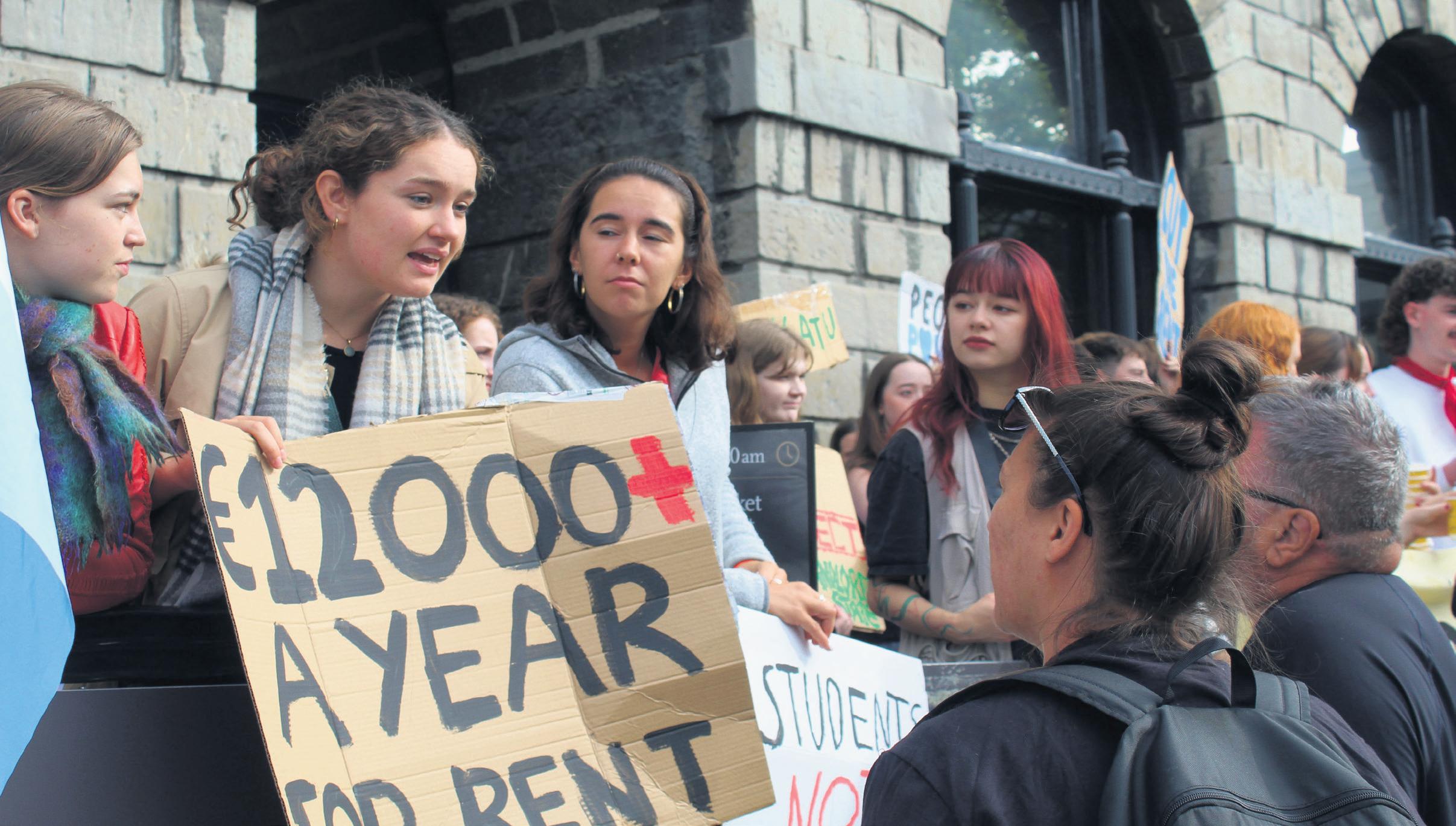
Clara Roche
EDITOR
T
The University received 10,862 first preference applications this year, down from a record high of 11,091 in 2022. In total, 22,354 students, constituting a quarter of CAO applicants, submitted applications to
Cost of Living
Hosanna Boulter examines the price of studying in ireland, and what it suggests for students living at home and living alone. PAGE 3 »

the University.Points cut-offs for single honours courses dropped by an average of 12 points, while requirements for joint honours courses rose by an average of 26. Last year, points fell by an average of 3.5 across courses.
One offers to CAO applicants today, two thirds of which will be the student’s first preference.Places in four single honours courses were allocated by random selection to students who achieved the minimum points requirement, compared to nine in 2022 and 17 in 2021. In a statement, Vice Provost Orla Sheils said she was “delighted”
CONTINUED ON PAGE 4 »
Sex Education
Clara Roche reviews the updated SPHE curriculum, and outlines what leaving cert students can expect from mandatory sex education, PAGE 3 »
B2 SPORT B12 FILM & TV R9 FEATURES B6 ART R2 LITERATURE R3 OPINION B8 FASHION R1 MUSIC R5 EDITORIAL B8 FOOD R7 THEATRE R4 Editor: Clara Roche Volume XV, Issue I ISSN: 2013-261X Phone: (01) 646 8431 Email: info@universitytimes.ie Website: universitytimes.ie This newspaper is produced with the financial support of Trinity College Students’ Union, but maintains a mutually agreed policy of editorial independence. To contact UT, write to: The Editor, The University Times, 6 Trinity College Dublin 2
Taking Back
Trinity: TCDSU Blockade
the Book
of Kells The Trinity College Dublin Students’ Union and the Postgraduate Workers’ Organisation staged a protest at the Long Room entrance in opposition to College’s decision to increase the price of student accommodation by the maximum legal limit. Read more in news, page 2 » PHOTO BY ELLA O’BRIEN FOR THE UNIVERSITY TIMES
Hosanna Boulter NEWS EDITOR

O
young people to attend, as well as venues for upcoming young artists to perform in. The funding will support more than 70 nighttime events across Ireland, which are aimed at young people in the 14- to 24-year-old age bracket. Allocation of funding has been decided based on whether the organisations or venues have a history of working with young people. The events are expected to take place from September to
December this year. A variety of events will be on offer such as open mic nights, improv, comedy, DJ workshops and sets as well as singer-songwriter nights.
The exact details of most of the events are yet to be released.
This scheme is the latest step that the government is taking in response to the recommendations from last year’s Night-Time Economy Report. The report highlighted the need to “increase opportunities for young
people to engage in the NightTime Economy, and specifically those activities which are not alcohol-based”.
Katherine Licken and John McCarthy, co-chairs of the NightTime Economy Taskforce, have previously highlighted how the nighttime sector has been “badly hit by COVID-19”. They also specified the need for “innovative solutions” such as this new
CONTINUED ON PAGE 5 »
YOUR ESSENTIAL GUIDE
The Trinity 20
Couture
Eloise Sherrard talks to the Fashion Soc founders of Campus Couture and how the initiative promotes community and creativity. Daly asks: “Where do we draw the line? What exactly separates porn from art?”
Announced to Create More Evening Events for Young People IN FOCUS
Eight Trinity Courses Exceed 600
CAO Points
Funding
USI: Increased College Spaces “Futile”, “Populist” Amid Accommodation Crisis
Brídín Ní Fhearraigh-Joyce
he Union of Students in Ireland has said that increasing the number of third-level places without extra accommodation and services is a “populist” and “futile” move by Government.
rinity will make 3,784 Round
NEWS
n Tuesday, 29th August 2023, Catherine Martin T.D., Minister for Tourism, Culture, Arts, Gaeltacht, Sport and Media, announced a new Night-Time Economy Youth Initiative. The €119,000 funding package is aimed at providing events for
TCDSU Block Entrance to Book of Kells in Protest of Rent Increases
Hosanna Boulter, Sáoirse Goes, Alex Payne and Clara Roche
On Wednesday, 13th September, the Trinity College Dublin Students’ Union (TCDSU) and the Postgraduate Workers’ Organisation (PWO) have blocked access to the Long Room and the Book of Kells.
The protest followed College’s decision to raise the price of student accommodation by 2%, which is the maximum legal increase permitted under Rent Pressure Zone legislation.

This move was condemned by the TCDSU in light of the ongoing housing crisis in Dublin. A recent Students4Change survey reported that 93% of Trinity students found on-campus housing to be unaffordable.
All TCDSU sabbatical officers were present at the protest, as well as Jeffrey Seathrún Sardina, the recently elected Chair of Trinity PWO. Union
of Students’ Ireland (USI) Vice President for Campaigns, Zaid Al-Barghouthi, is also present.
People Before Profit TD Richard Boyd Barrett TD offered support to the protesters on Twitter, criticising College’s “appalling” attempt to “maximise their profit over the wellbeing of students”.
On site, Dean of Students Dr. Richard Porter condemned the protest, suggesting that the loss in revenue would negatively impact students.
He promised to broker a 2% rent freeze with “the powers that be”, saying: “Going forward I’ll negotiate on behalf of you, strongly, but I need access to the place.”
Speaking to the crowd, TCDSU President László Molnárfi said: “The only way we will end our blockade is if the Provost comes down her-
self and gives a commitment to the press that there will be a two year rent freeze on all Trinity accommodations.”
In a statement, College said: “This 2% increase was part of a three-year plan that will expire this year and will be subject to review.” Acknowledging that students “have every right to protest peacefully”, the statement continued: “Blocking the entrance to the Old Library of Trinity College Dublin, which holds the Book of Kells, is counter-productive. Income from the Book of Kells exhibition is vital for running the university and for providing services to students. Actions like today’s blockade only worsen the situation for everyone.”
Former TCDSU President Domhnall McGlacken-Byrne, who served from 2014 to 2015, refuted College’s statement, Tweeting “When I was president we got the same assurances that it was only a 3-year thing, but TCD rents have risen 3-4% p.a. for at least 10 years in a row now!”
Molnárfi defended the Union’s
Scholars’ EGM Vote to Amend Charter and Elect First Year Rep
Brídín Ní Fhearraigh-Joyce DEPUTY NEWS EDITOR
On September 13th, at the Jonathan Swift Theatre, the Scholars of Trinity voted to make two amendments to the Scholars’ Charter at an Emergency General Meeting (EGM).
The Scholars voted in favour of changing Clause 5 of the Scholars’ Charter. The new amendment will allow for the appointment of a president to the Scholars’ Committee. This president would be an “influential” member of Trinity’s faculty, who would be appointed by the Scholars’ Committee. The role of the president would largely be one of oversight over the committee.
The Scholars’ secretary, Andrew Burgess, explained, “When Patrick Prendergast was provost, he proposed budget cuts to the Scholars. The reason that Scholars live in Trinity Halls, rather than remaining on campus, is something that Paddy Prendergast advocated for. While Prendergast was provost, there was also talk of a cap on Scholars at the time, which was something that we as volunteers had to oppose”.
Burgess continued, “The only people representing the Scholars’ interests is the [Scholars] Committee. The appointment of a professor would strengthen the position of the Scholars”.
The Scholars’ Charter also voted in favour of a change to Clause 9, Subclause B. The Scholars voted for Scholars’ alumni to be eligible to apply for positions on Scholars’ subcommittee. The second change to the clause was to cap the number of Scholars on subcommittees, as the wording of the Charter meant that unlimited amounts of interested Scholars could join subcommit-
tees that oversee alumni events or the Scholars’ Ball.
The EGM also saw the first year Scholar representative elected by vote. Rachel Chen, a third year dentistry student, was successfully elected. Upon Chen’s election, Iyad O’Brien, the former PRO of the Scholars’ Committee added, “[the] passion to join the committee is great, as we usually struggle to fill [committee] spaces”.
The Scholars’ Committee serves as the official representative body of all Scholars. The Scholars’ Charter was adopted in May 2006 and was last amended in April of 2021.
decision to take direct action, saying: “If they take money from students, then the students will take money from College, by blockading one of Trinity’s most profitable attractions.”
According to Molnárfi, the Book of Kells brings in an estimated
€30,000 to €50,000 each day, with tickets priced at €18. College made a net profit of €10.9 million in 2018.
The Labour Party spokesperson for further and higher education, Annie Hoey, denounced the College’s position, calling the choice to raise rents “truly outstanding” in the context of the housing crisis. Trinity students are “standing up against being seen as cash cows”, she continued, adding that “the cost of accessing accomodation should not be a barrier for anyone accessing education, and Trinity’s decision to disadvantage its students is simply unbelievable”.
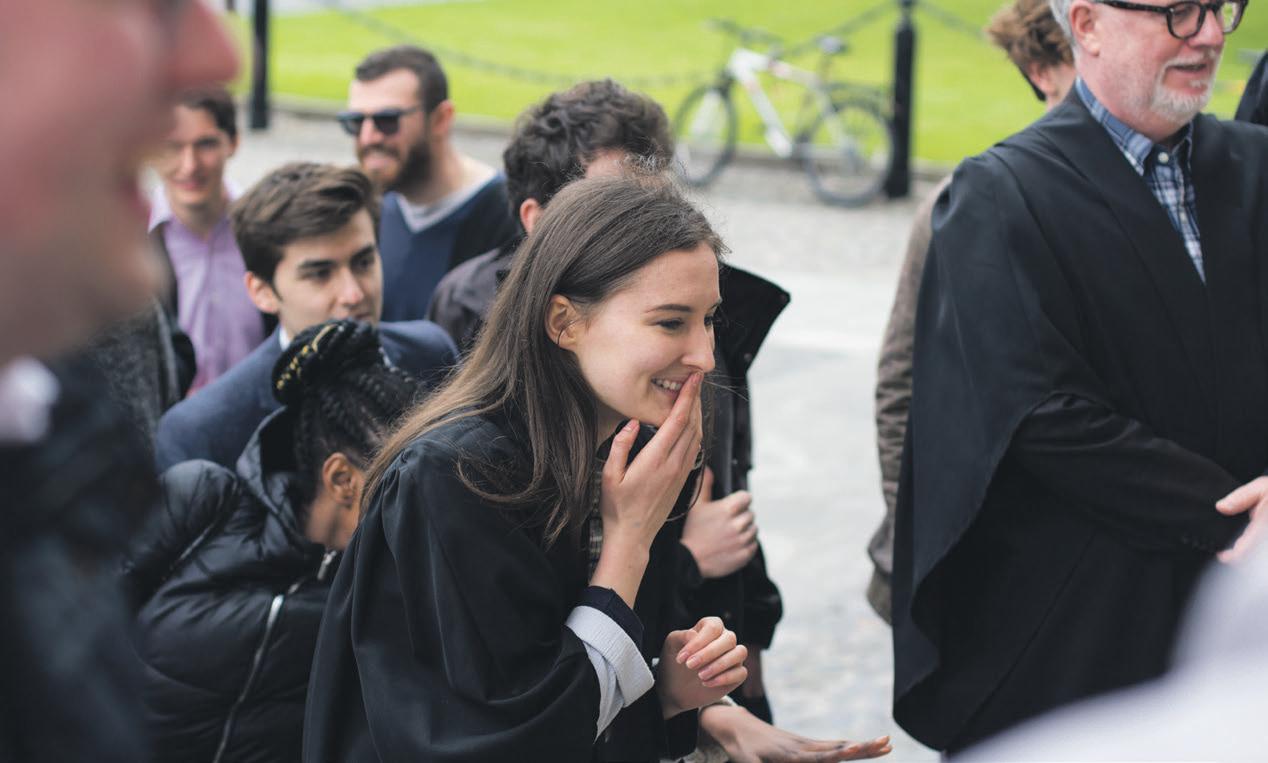
Protesters allowed staff to enter the building, with Molnárfi extending solidarity on behalf of the Union to all security staff, lecturers and postgraduate researchers. “We are fighting the same battle”, he said.
Molnárfi added: “We would invite all other senior management to also come down and talk to us.”
Education Officer Catherine Arnold led the crowd in a chant: “What do we want? Fair rent. When do we want it? Now.”
Throughout the protest, Molnárfi repeatedly condemned the “hypocrisy” of the College, accusing officials of treating students as “cash cows”. “College is complicit”, he stated. “Trinity prices people out of education.”
Several members of the public confronted Molnárfi and Arnold, with one private tour guide telling the protesters to “get a life and go away”.
Protesters remained in place until the end of the working day. Security were present on site, but did not intervene.
Hundreds Attend Protest Against Trans Rights and Counter Protest
Brídín Ní Fhearraigh-Joyce DEPUTY NEWS EDITOR
September 16th saw hundreds attending two protests in Merrion Square. The Let Women Speak (LWS) rally, organised by Posie Parker, was disrupted by a counter-rally organised by Trans and Intersex Pride Dublin (TIPD) held opposite the LWS rally on Merrion Square South.
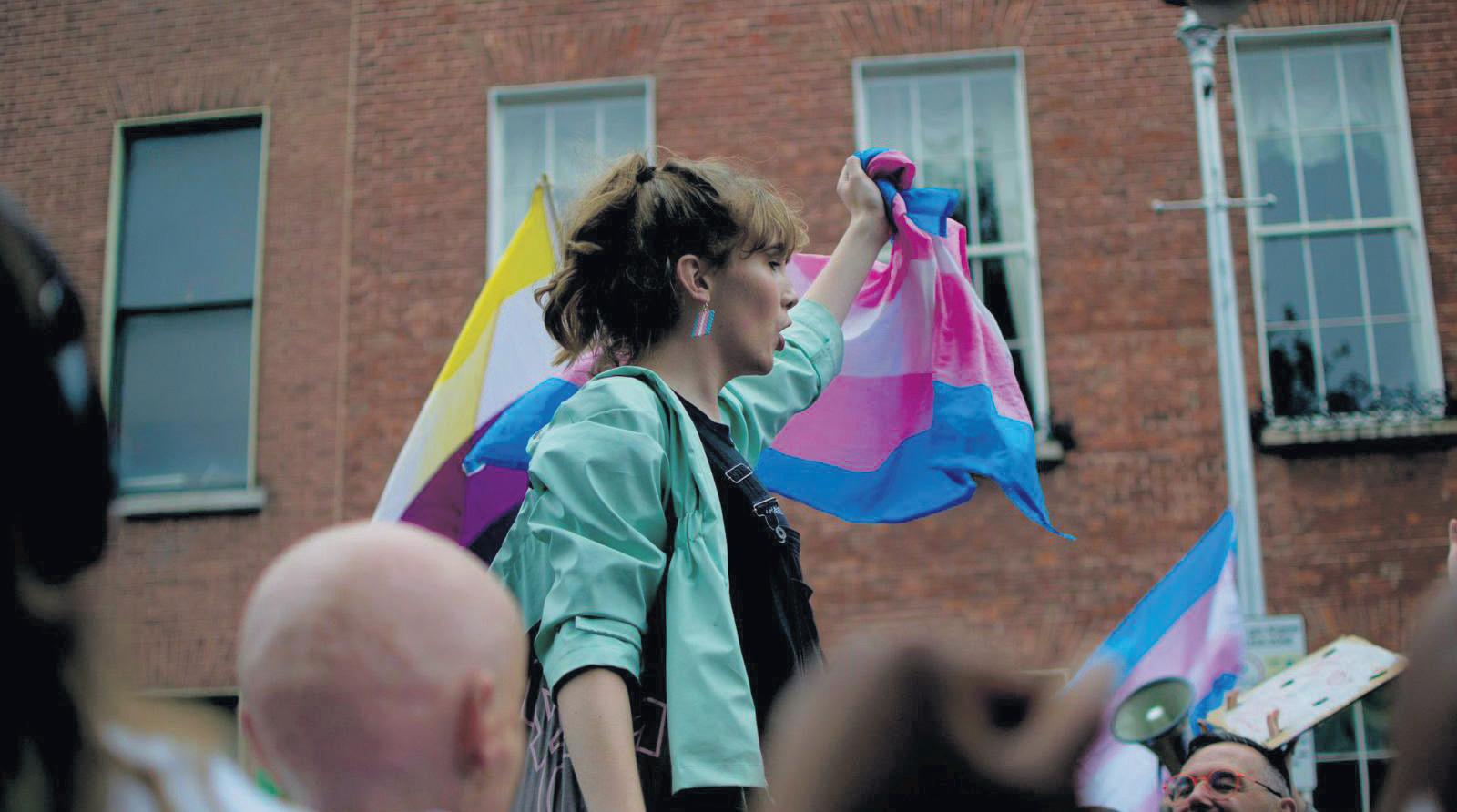
Posie Parker, also known as Kelly-Jay Keen, is a British anti-trans activist.
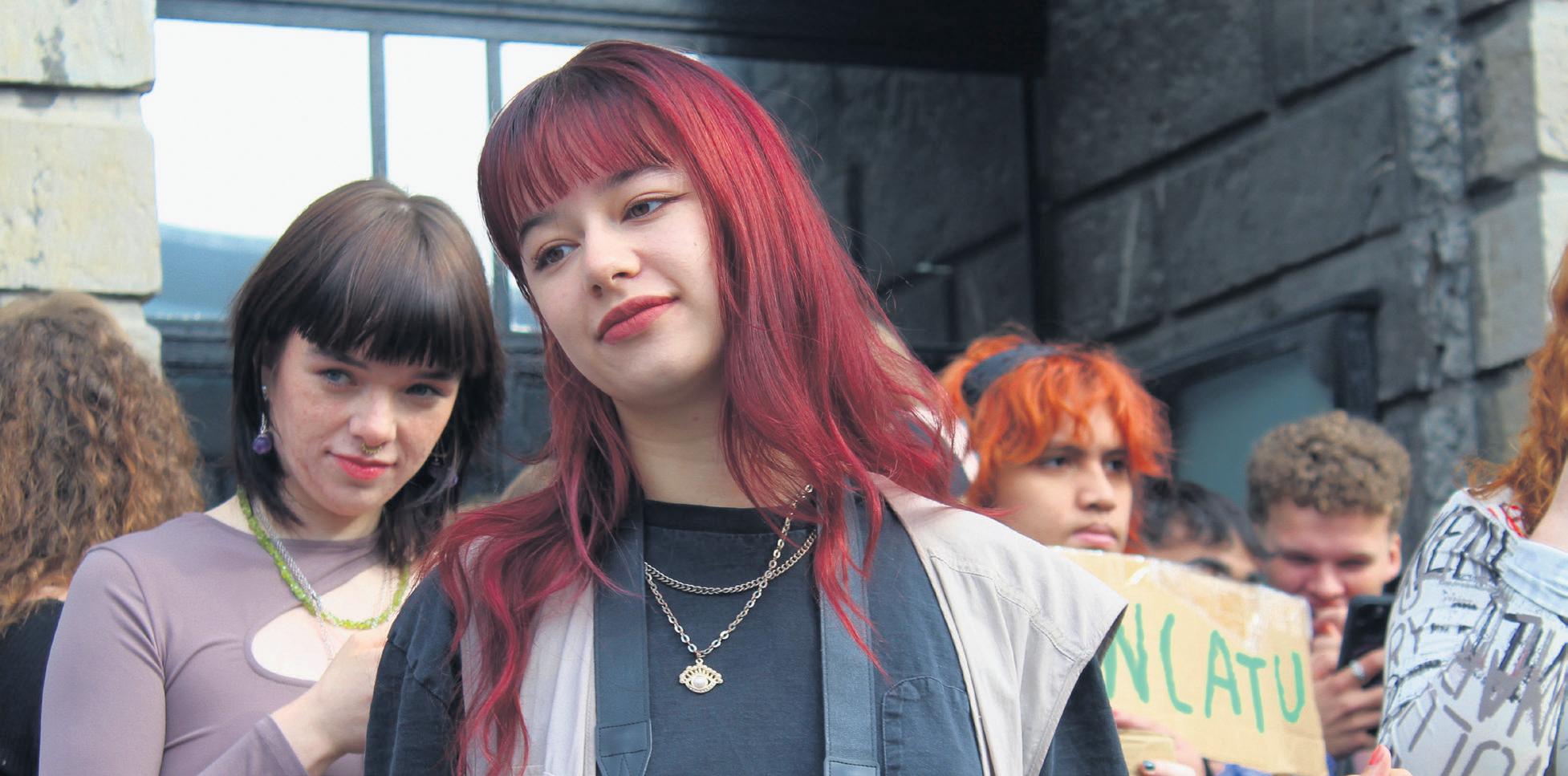
Graham Linehan, former Father Ted and The IT Crowd creator, spoke at the LWS rally. Linehan, who was previously banned from Twitter for expressing “hateful conduct”, stated at the rally that “we need to reverse self identification”. Ireland passed the Gender Recognition Act in 2015, which permits trans people to legally self-identify as their gender.
Also in attendance at LWS was the far-right anti-immigration figure, Philip Dwyer, alongside the representatives from the anti-trans group, ‘The Countess’. A portion of the attendants of the LWS rally flew from the UK to Dublin to partici-
pate in the rally.
Attendance at the TIPD counter-protest included members of the Union of Students of Ireland (USI), SIPTU, and TCD’s Student Union. Trans rights activist Jenny Maguire addressed an audience that outnumbered the LWS rally. Maguire led the chant “trans rights are human rights”, and stated that, “trans people aren’t going anywhere”.
Speaking to The University Times at the counter-protest, TCDSU President László Molnárfi said, “TCDSU are here in solidarity with the trans community and with the LGBT community against the far-right. We are here today to oppose the growing far-right in Ireland. We are protest-
ing Posie Parker who is a TERF [trans exclusionary radical feminist]. She is one of those gender-critical people”.
He continued, “Essentially what this means is [that] her ideology wants to make the life of trans people really difficult […] So we are standing up against that.”
“I think the rise of the far-right should worry everybody in society. They threaten vulnerable groups. The people who are attending the Posie Parker event are the same people who would be for example attending anti-migrant protests. They are funded by essentially the same groups - it’s the far right. We are here to stand up against that, as a community”.
The University Times Monday 18 September, 2023 2 NEWS
“
The only way we will end our blockade is if the Provost comes down herself and gives a commitment to the press that there will be a two year rent freeze on Trinity accomodations.
“
If they take money from students, then the students will take money from College, by blockading one of Trinity’s most most profitable attractions.
PHOTO BY ELLA O’BRIEN FOR THE UNIVERSITY TIMES
PHOTO BY ELLA O’BRIEN FOR THE UNIVERSITY TIMES
PHOTO BY EDMUND HEAPHY FOR THE UNIVERSITY TIMES
PHOTO: TRANS & INTERSEX PRIDE DUBLIN
The Price of Studying in Ireland, Revealed
Hosanna Boulter
NEWS EDITOR
On Tuesday 5 September,
Zurich Insurance released their annual report, “The Cost of Education in Ireland 2023”. Their report found that a majority of students (68%) are currently living at home whilst studying at third level education. This statistic was 10% higher when compared with 2022, when 58% of students studying at third level education were living at home.
The report also found an increase in the annual and lifetime cost for students in Ireland living in student accommodation, despite the government’s partial refund of university fees last year. The annual
cost was reported at €16,538, which was an increase of €1,384 from 2022. The annual cost of student accommodation increased by almost half from €7,518 to €10,007. Trinity is one of the college’s that has chosen to raise the prices of its student accommodation by the maximum legal amount, a move that the TCDSU has condemned.
Dublin’s student housing crisis has been reported on before by The University Times. The Irish government has acknowledged the crisis and recently launched the renta-room scheme. Under the terms of this scheme a homeowner can rent out a room or rooms in their home, or even rent out an attached but self-contained unit and not be
taxed on the first €14,000 of their rental earnings.
The annual average cost of transport for students fell by €123 from the 2022 figures. This likely reflects the government’s 50% public transport fare reduction for young people, aged 19-23, on Dublin Bus, Iarnród Éireann, Bus Éireann, Luas, Go-Ahead Ireland, and TFI Local

Despite pleas from TCDSU, Trinity is set to raise the cost of its student accomodation by the maximum legal amount
Link. This was coupled with a 20% fare reduction for young people on all public transport. This means the cost of travel for some people ended up being reduced by 60%.
The sizeable increase in the cost of student accommodation, coupled with the reduction in the cost of public transport for young people are likely factors in the 10% increase of the amount of third level students living at home.
Nevertheless the cost of rented accommodation for students in third level education dropped by over €2,000, so this increase in students living at home cannot be solely attributed to the cost of accommodation.
The overall cost of third level education for students living at home dropped by over €1,000 year on year, probably partly due to the lower cost of public transport. This may also help explain this marked shift towards living at home whilst studying at university.
TCDSU, UCDSU Launch Joint Digs Drive
Phoebe Pascoe
Trinity College Dublin Students’ Union (TCDSU) and University College Dublin Students’ Union (UCDSU) are collectively urging homeowners with spare rooms to rent to students in need of housing.
Thousands of homes near or commutable from the College Green, Belfield and Smurfit campuses will receive leaflets from the unions in an attempt to help students who have not been able to secure accommodation for the upcoming term.
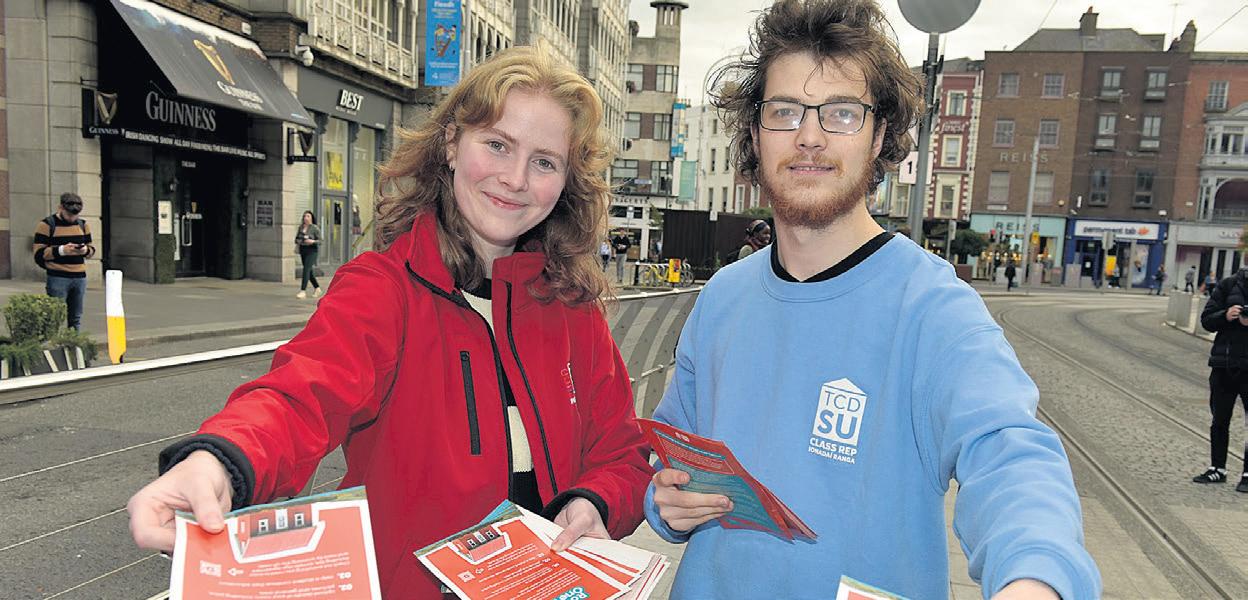
At the launch of the digs drive, UCDSU President Martha Ní Riada highlighted that “digs arrange-
ments are increasingly a part of the student housing landscape, so this needs to be done in a way that is fair to students”.
Ní Riada urged those renting rooms to students to “consider offering a seven day arrangement where possible, as five day lets are unsuitable for many, in particular
international students”. In addition, the unions asked homeowners not to engage in the practice of charging seven day rents in exchange for five days of tenancy”.
She also referenced the Rent-aRoom Relief Scheme, which enables those who rent out a room in their home to earn up to €14,000 in tax-
László Molnárfi, TCDSU President:
free income. Ní Riada asked those utilising the scheme “to ensure that the lodger has access to appropriate facilities and isn’t subject to onerous conditions, or not to make a stay contingent on other conditions, such as housework or caring responsibilities”.
TCDSU President László Molnárfi detailed the experiences of students not able to find housing due to the
housing crisis, including “sleeping in cars, couchsurfing with friends or dropping out of education altogether”.
In an attempt to mitigate the problems students face finding housing, Molnárfi said the unions “call on anyone who has a spare room to rent to sign up to our accommodation platforms”. He also expressed a need for “the govern-
ment to treat housing as a human right, not as a commodity”.
A recent survey found that onethird of students in universities and colleges are experiencing “serious” financial problems. Accommodation was named as the single biggest source of expenditure among students in higher education, with average monthly rents reaching €469 per month across the country, up 13% from the most recent figure of €415 in 2019.
PHOTO BY TOMMY CLANCY
Sex Ed. to be Compulsory for Leaving Cert Students
Clara Roche
EDITOR
The leaving cert curriculum is set to be updated to include mandatory sex education for the first time.
Fifth and sixth year students will learn about sexual and reproductive health, the importance of consent, and the impact of pornography. The new syllabus, a draft of which was published yesterday, is designed to be inclusive of all genders and sexualities, and present gender as an “internal and individual experience” distinct from sex
assigned at birth.
The course will also teach students to identify unhealthy and abusive behaviours within relationships, and equip them with the skills to communicate their feelings, respect others’ boundaries, and challenge harmful attitudes.
The new curriculum is expected to be implemented in September 2024. Schools will introduce one hour of mandatory Social, Personal and Health Education (SPHE) per week, or 60 hours across fifth and sixth year. The subject will not include an official leaving certificate examination but will allow for inclass assessments.
Jeffrey Seathrún Sardina Elected PWO President
Parents of students under 18 will retain the right to opt out of any classes that contradict their beliefs, and students over 18 may do the same. The National Council for Curriculum and Assessment (NCCA) will analyse and report on feedback received.
The Irish Times found that most schools do not schedule sex education classes for senior cycle students. In 2018, Trinity students joined a protest outside Leinster House to call for the inclusion of unbiased sex education in the secondary school curriculum.
Alex Payne ASSISTANT EDITOR
The first Annual General Meeting (AGM) of the TCD Postgraduate Workers’ Organisation, held Friday September 1st, saw Jeffrey Seathrún Sardina elected President and the organisation’s first constitution approved.
Eighteen postgraduate students voted in the presidential election, with 94.4 per cent voting for Sardina and the remaining voters opting to reopen nominations. One hundred per cent of voters approved Sardina’s proposed constitution.
Describing himself as “very happy” to have won the election in a statement to The University Times, Sardina plans “to empower our members to win our rights”.
The government review on PhD supports came three months late, according to Sardina, and “made no meaningful suggestions regarding non-EU rights, disabled PhD rights, workers’ rights, working conditions, or the right to maternity [or] paternity leave”.
On June 26th, 2023 Minister for Higher Education Simon Harris
published the independent report on supports for PhD researchers in Ireland. The report made one necessary recommendation, to take effect no later than January 1st, 2024: to increase the PhD stipend to €25,000.
This stands in contrast to the recommendation that the Department of Higher Education and the Departments of Justice and Enterprise, Trade and Employment “continue the dialogue” surrounding the challenges facing non-EU PhD students.
The challenges included in the report are visa and health insurance costs, the years spent as a PhD student not counting towards citizenship and accompanying spouses being unable to work under the ‘Stamp 2’ student visa.
Sardina argues that the independent report is “now being used to slow progress on PhD rights and pay – colleges and agencies are delaying action until there is governmental action on the report, rather than taking responsibility themselves. It has become a form of legitimised apathy, rather than a guide to implementing PhD rights.”
The now accepted constitution aims to “promote and protect” the
five key principles of the national Postgraduate Workers’ Organisation: basic rights and dignity, quick action, diversity, accountability and institutional knowledge.
These principles are part of the PWO’s mission statement, which is guided by the Fair Postgraduate Researchers Agreement (FRA).
The FRA, prepared by the national PWO, addresses concerns about the employee status and working conditions of postgraduate students – two areas that Harris’ report contains no recommendations on.
“This is the year for action”, and the year for postgraduate rights, says Sardina. “If necessary, and based on the demands of our membership, I am entirely willing to stand up to Provost Linda Doyle and Minister Harris”, says Sardinia.
He has already shown his readiness for direct action, having encouraged and participated in disruptive protests around campus last year. For now, he plans to expand his team by calling an emergency general meeting to elect the PWO’s Executive Board and Steering Committee members.
Sardina previously served as the Chair of the Editorial Board of The University Times
NEWS
68% of Irish students live at home while studying, compared to 58% in 2022
“We call on the government to treat housing as a human right, not as a commodity.”
ASSISTANT EDITOR
The University Times Monday 18 September, 2023 3
The course will teach students to identify unhealthy behaviours within relationships, and equip them with the skills to communicate their feelings, respect others’ boundaries, and challenge harmful attitudes.
Eight Trinity Courses Exceed 600 CAO Points Trinity Remains in Top 100 Universities
« CONTINUED FROM PAGE 1
to reduce this number, calling the process of random selection “particularly difficult for students”.
The four courses offered by random selection were Psychology, Management Science and Information System Studies (MSISS), Pharmacy and Business, Economic and Social Studies (BESS).
Two single honours courses, Dental Science and MSISS, required the maximum grades of 625 points. In the case of MSISS, because of random selection, not all applicants who obtained the maximum 625 points were offered a place. Eight courses required at least 600 points at Round One, down from nine last year.
PHOTO
The minimum points requirement for Medicine dropped from 745 points to 741, accounting for the inclusion of HPAT points.
Sheils commented: “In the case of Medicine, it’s evident that the provision of additional student places has had an impact. This shows what can be done to alleviate pressure on students, in the
SINÉAD
BY FOR THE UNIVERSITY TIMES
interests of our broader society, when government acts to support higher education”.
Middle Eastern and European Languages and Cultures (MEELC) saw the biggest drop in points, falling from 552 to 473. Following a 131% increase in applications for Music Education, points for the course rose by 103 to 555.
Sáoirse Goes DEPUTY EDITOR
Trinity has risen to 81st place in the QS World University Rankings for 2024. This comes after the college secured its place in the top 100 last year, moving from 101st to 98th in the rankings for 2023.

The QS rankings measure the performance of the world’s top 1,499 universities in 104 countries.
The rankings are compiled based on six factors: international faculty, international students, academic reputation, citations per faculty, employer reputation and faculty-to-student ratio.
Trinity particularly excelled in the citations per faculty metric, ena-
bled by increased funding for research in the college.
Trinity also performed well in the academic reputation metric, based on survey responses from international academics.
In a press statement today, Provost Dr Linda Doyle expressed that “this outcome is good news for us”, while also stressing that “rankings don’t reflect the full breadth of all the important things we do, and we have lots more to be proud of in Trinity”.
“We need proper sustained longterm investment in people and infrastructure to ensure the conditions exist for our students and staff to excel”, Doyle continued, specifying that “investment such as this in higher education benefits our students, our society, and Ireland’s standing in the world”
In a press statement, Dean of Re-
search Dr Sinéad Ryan said “Researchers in Trinity have always produced excellent, impactful research of the highest standard that is recognised by their peers around the world”.
“However, they do this with infrastructure and equipment that is crumbling and in a system that has been chronically underfunded for years”, she added, stressing the need “for more sustained government funding to keep Ireland’s universities internationally competitive and to continue nurturing talent, enabling discovery, and pushing the boundaries of human knowledge”.
Last year, Trinity returned to the top 100 of the QS rankings for the first time in five years, having fallen from 88th place in 2017 to 108th the next year.
Rare Orchid Blooms on Trinity Campus
Sáoirse Goes DEPUTY EDITOR
Arare orchid has appeared on Trinity’s front square as a result of an initiative designed to allow wildflowers to bloom throughout the month of May.
Trinity stopped mowing several of its formal lawns across campus as part of the No Mow May campaign, an annual action started by Plantlife in the United Kingdom and promoted by the All-Ireland Pollinator Plan, co-founded by Professor Jane Stout, Trinity’s Vice President for Biodiversity and Climate
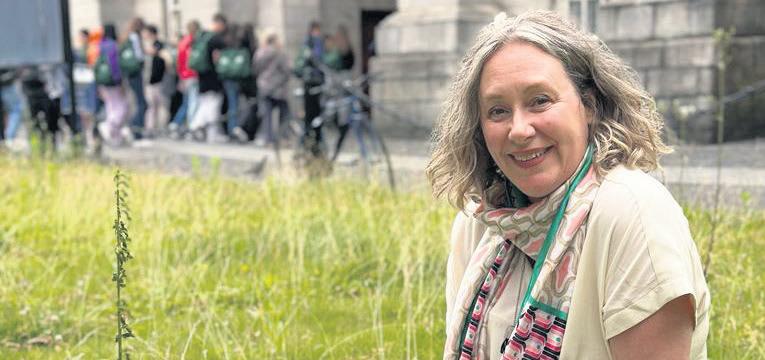
Action.
Without the frequent mowing, wildflowers like clovers and daisies have bloomed, providing essential nutrients for pollinating insects, which are currently in decline.
Professor Jenny McElwain, Chair of Botany, spotted a broad-leaved helleborine orchid growing under a birch tree in Front Square. This type of orchid occurs across a wide geographic range but is never common in any one place.
The broad-leaved helleborine orchid is a woodland plant, although it can also be found in manmade environments, like parks and gardens.
Its roots are closely associated with ectomycorrhiza fungi, as its
seeds need the fungi in the first few weeks to germinate and grow. The fungal partner of this type of orchid is also a common partner of birch trees, which likely links the growth of this flower to its neighbouring tree via a threadlike underground fungal connection.
Botanists remain uncertain as to the origins of the orchids on campus. In a press statement today, Professor McElwain explained that “the tiny dust seeds could have been transported by birds or humans or the wind”.
She continued, speculating that these orchids have possibly “simply been lying in wait, dormant in the soil for decades waiting to be given a chance to grow”.

Following the discovery of the helleborine orchid, Trinity has decided to extend the no mow period through June.
This has led to the discovery of a second orchid species nearby, the pyramidal orchid, whose predominant characteristic is its deep purple colour.
A botanical survey of the Front Square lawns carried out at the end of May found more than 30 different plant species blooming. This increase does not seem to be slowing, as more are emerging every week. ILLUSTRATION BY LAUREN DE CHAUMONT
USI Urges Affordable Housing, Tenant Protections in Submission to Private Rental Sector Review
this review, as the rental sector and students are inextricably linked. The student accommodation sector is in crisis, but there are solutions that the Government can take on board to address this crisis.”
The Union of Students in Ireland (USI) has published its submission to the Government’s Review of the Private Residential Sector, arguing that issues relating to the availability and affordability of housing “seriously and negatively affect the student experience in Ireland”.
In the submission, published on Tuesday 22 August, the USI criticsed the lack of protective structures in place for students availing of Renta-Room schemes, or “digs”, as well as the ineffectiveness of the current National Student Accomodation Strategy. In addition, the submission called for the eradication of luxury student accommodation and for a referendum to establish a constitutional right to housing, naming the latter as “an area of critical concern”.
Zaid Al-Barghouthi, USI’s Vice President for Campaigns and former Trinity College Dublin Students’ Union (TCDSU) International Officer, said of the submission: “The voice of students must be heard in
The USI claimed that the current absence of a constitutional right to housing reinforces an “asymmetric balance of power in our society between landlords and renters’, a sentiment echoed by TCDSU in its own submission to the review. TCDSU stated: “In a market economy, the interest of landlords is diametrically opposed to that of the tenant, and is diametrically opposed to the concept of housing as a human right.”
The TCDSU submission included student testimonials to highlight the ongoing crisis. One anonymous student found that their “mental and physical health were being neglected in order to maintain living arrangements and pay fees”. Another reported being “priced out of accommodation” and “forced to travel three hours a day as a student with a physical disability”. The submission referenced the results of a recent Students4Change survey, which reported that 93% of Trinity students found on-campus housing to be unaffordable.
The USI submission further criticised the instability created through renting rather than owning one’s home. It suggested that “viewing renting as a lifelong option” serves to ensure “that the current and upcoming generations live in a state of perpetual insecurity about the satisfaction of their most fundamental needs”.
Moreover, the submission condemned the classification of certain student renters as “licensees” rather than tenants, claiming that the
position of a long-term licensee is “precarious and unbalanced” compared to that of a tenant. The USI argued the increased likelihood of a licensee facing a non-fault eviction, receiving an unannounced inspection and resulting fine, or being subject to a rent increase outside the limits imposed within Rent Pressure Zones. The union called for the restriction of licensee classifications to short-term rentals such as hotels. The union also called for a clear
definition of affordability, pointing out that funding is granted to third-level institutions for the provision of accommodation on the condition that it is affordable, yet there is no “clarity relating to what the term of affordability entails”, let alone an “enforcement mechanism”. The lack of an enforced affordability framework, the union continued, allows for an influx of luxury student accommodation, which “most students could never dream of affording”. The submission recommended
eradicating such establishments through the introduction of a price cap on properties labelled as student accommodation, as well as implementing rent freezes until the housing market stabilises through an increase in available properties.
Regarding quality control and tenant protection, the submission recommended the enforcement of minimum room sizes, as well as standards set for rent-a-room schemes, or digs. It also called upon the state to take a more proactive approach by providing clear and accessible information to “keep both landlords and tenants informed about any changes to housing standards or enforcement procedures through regular updates via email, newsletters, or social media”.
The USI submission to the review follows that of TCDSU, in which the latter union declared support for “a restoration of the eviction ban, severe restrictions on nofault evictions, seizing of vacant and derelict properties, a ban on AirBNBs in Dublin, and People Before Profit’s Rent Control Bill alongside Sinn Féin’s legislation to ban sex for rent”.
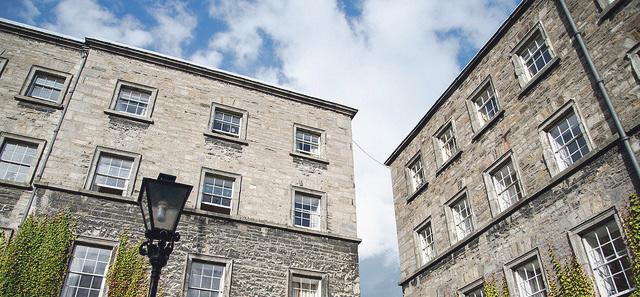
The University Times Monday 18 September, 2023 4 NEWS
BY
BAKER
Clara Roche EDITOR
PHOTO BY SINÉAD BAKER FOR THE UNIVERSITY TIMES
Trinity Senator Introduces Bill to Guarantee Disability Supports
Clara Roche
EDITOR
Independent Trinity Senator Dr
Tom Clonan has introduced a bill to make it legally obligatory for the state and the Health Service Executive (HSE) to provide disability supports deemed necessary in assessments of need.
The bill, which was supported by all Independent Senators including former Trinity College Dublin Students’ Union (TCDSU) President Lynn Ruane, would amend the Dis-

ability Act of 2005 and the Equal Status Act of 2000. Currently, the state and the HSE are legally mandated to provide assessments of need to disabled citizens, and the bill would extend the required provisions to guarantee citizens the legal right to access therapies.
The bill passed uncontested despite a proposed government amendment calling for the Bill to be read a second time later in the year. In response to the amendment, Clonan appealed to the government, saying: “You know in your heart of hearts the purpose of that amendment. It is simply to kill the
bill”. The vote on the amendment did not occur as no tellers were appointed, and the bill was passed.
Examples of interventions deemed necessary at the assessment stage might include “access to personal assistance, access to physio, speech, occupational therapy, and supports that our disabled citizens need to live independent and meaningful lives”, Clonan explained on Twitter.
Speaking to The University Times in February 2022, Clonan expressed his belief that it is “life-limiting” to have a disability in Ireland: “It is the worst country in the European Union to have a disability on every
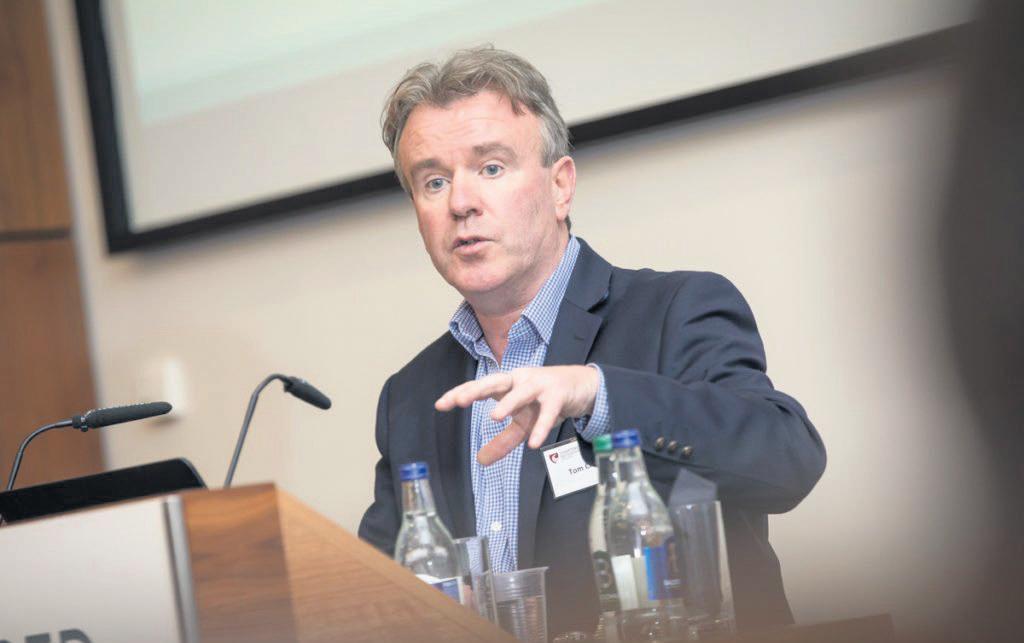
measure: socialisation, poverty, homelessness, sub-optimal medical outcomes.” At present, Ireland is the only country in the European Union without a legal requirement to provide the supports outlined in an assessment of need or equivalent evaluation.
Clonan’s son Eoghan was diagnosed with a rare neuromuscular disease as a child and now uses a wheelchair, sparking the Senator’s interest in disability activism. Clonan was elected to the Seanad on his third attempt in March 2022.
64% Trinity Professors Call for 100% Plant-Based Catering
divestment”.
campaign began in 2021 in the UK.
agriculture.”
Brídín
Ní Fhearraigh-Joyce
DEPUTY NEWS EDITOR
6
4 Trinity professors have signed a letter calling for universities to commit to “transition to 100% sustainable and just plant-based catering”.
The letter read, “We are acutely aware – as you must be too – of the climate and ecological crises; not only this but we are also mindful that animal farming and fishing are leading drivers of them”.
Addressed to University Vice-Chancellors, Catering Managers and Students’ Union Presidents, the letter stated that “most universities have declared a climate emergency, with many taking steps such as fossil fuel
Trinity Professor Named on Inaugural TIME100 AI List
Hosanna Boulter
NEWS EDITOR
On Thursday, 7th September
TIME unveiled its first-ever
TIME100 AI list, featuring Trinity Computer Science professor Abeba Birhane.

The list spotlights 100 people ranging from “the industry leaders at the forefront of the AI boom, individuals outside these companies who are grappling with profound ethical questions around the uses of AI, and the innovators around the world who are trying to use AI to address social challenges”, TIME’s chief executive Naina Bajekal said.
Professor Birhane was selected to appear on the cover of the magazine, alongside a handful of her fellow nominees.
Professor Birhane is an Adjunct Assistant Professor in the School of Computer Science and Statistics at Trinity College Dublin. Her research focuses on the “challenges and pitfalls of automating human behaviour through critical examination of existing models and audits of large scale datasets used for training state-of-the-art AI models”.
She also serves as a Senior Advisor in AI Accountability at the Mozilla Foundation. Recently, Professor Birhane was featured in Wired UK and the renowned international journal Science for her work.
On being named in the TIME100 AI
list, Professor Birhame said:
“I am extremely thrilled to be included on the list among some of the most inspiring scholars whose work I greatly admire.
“The current AI landscape, especially developments around generative AI, is simply unpredictable.
“There is currently so much noise which makes deciphering hype from reality difficult.
“One current interesting development is the emergence of numerous lawsuits around data harvesting practices.
“Such developments, if persistent, could be key to responsible and accountable data creation, curation and management practices”.
The petition was signed by over 650 academics in Ireland and Britain. The College’s signatories are part of a larger campaign made up of academics, public figures, industry professionals, alumni, student union leaders and grassroots campaigners calling for universities to act “in line with their own climate goals” by providing solely meat-free menus on campus.
The letter further elaborated: “Not vegan? That’s okay. We are not asking for individual dietary changes. Students and staff can still bring whatever food they like onto campus. What we are asking for is institutional divestment [from animal agriculture systems].”
The Plant-Based Universities
The campaign started as an action led by the environmentalist group, Animal Rising. Animal Rising (formerly Animal Rebellion) is a splinter group of the non-violent direct action group, Extinction Rebellion. Animal Rising operates with a particular focus on the intersection between animal rights and climate change, prioritising systemic change over individual actions in response to the climate emergency.
The letter cited the “long history and tradition of student activism and radicalism” as the reasoning behind the campaign targeting universities. “Just like universities were among the first institutions to divest from fossil fuels, they can be the first to divest from animal
In April 2023, the last of the college’s investments in fossil fuels were said to be diverted to funds with positive Environmental, Social, Governance (ESG) ratings, a measure of how products or services contribute to sustainable development. The pledge was followed by campaigning from the grassroots activist group, Fossil Free TCD. Alarge-scale study found that cutting meat and dairy is “the single biggest way” to reduce negative human impact on the planet. The findings revealed that meat and dairy production is responsible for 60% of agriculture’s greenhouse gas emissions, while the products themselves provide just 18% of calories and 37% of protein levels around the world.
Funding Announced to Create More Evening Events For Young People
« CONTINUED FROM PAGE 1
funding scheme, in the Taskforce’s 2021 report.
The Minister also announced the museums that have been awarded funding under the After Hours at the Museum Grant Scheme. The scheme, which was announced in mid-July, aims to “support museums and galleries to open their doors later by giving innovative
events to encourage people to enjoy a more diverse nightlife”. A total of €620,000 was given to 51 organisations and museums with over 220 events being announced across the country.
In Dublin, the EPIC Museum will be hosting four concerts of choir performances and spoken word in November and December. The Airfield Estate in Dundrum is putting on a number of concerts and lateevening tours. The UCD Classical
Museum will present six events in poetry, story-telling, art and music. Dublin Castle will be hosting a ball in November and running six late-night tours. 14 Henrietta Street will provide tours, including a journey through the city’s poetry and tenement plays, in addition to live music and drawing events. Finally, the Joyce Tower Museum will run a week of events, including readings and musical performances in September.
Dublin After Dark: The City’s Alternative Nightlife

The University Times Monday 18 September, 2023 5 NEWS
PHOTO: TOMCLONAN.IE
PHOTO: LERO.IE
Maisie
discovers the captivating charm of Dublin’s distinctive nightlife, where unconventional and offbeat experiences unfold, offering a thrilling departure from ordinary nights out. Read more in Radius, page 4 » PHOTO BY ISABEL FARRINGTON
Greener
Can Students Sustain The Stereotypical College Lifestyle?
We hear of people going to the Pav twice a week and partying constantly, but how much of this is true and how much is a facade? Is this lifestyle even sustainable financially, academically and emotionally?
 Ella Sexton DEPUTY FEATURES EDITOR
Ella Sexton DEPUTY FEATURES EDITOR
Afew years ago when I thought about what college would be like, my mind was immediately transported to the ideals one could only hope would become a reality. It seemed like the inauguration of the college lifestyle was obsessively drinking your way through Freshers’ week - amidst partying and other social shenanigans - and showing up to class styled to perfection every day, all while somehow achieving an effortless First in modules despite missing most classes due to a crippling hangover from said partying. I, too, had fallen victim to the Normal People and Legally Blonde romanticised depictions of university. I thought there was no alternative way college could be other than years of sailing through socialising, but within a few weeks of being a Junior Fresher in Trinity, this image no longer withstood the test of time.
I am nearly certain some people are just like me in this regard when it comes to realising the stereotypical college lifestyle is, in fact, not sustainable. Yet as we welcome our freshers of the academic year of 2023/2024 I think it might be nice to remind people that not all of what you see is true or attainable. We hear of people going to the Pav twice a week and partying constantly, but how much of this is true and how much is a facade? Is this lifestyle even sustainable financially, academically, and emotionally? Arguably, it is almost impossible to keep
up with this expectation of what life should look like. Not only is living like this mentally and physically draining, it is costly and can have a knock-on effect when it comes to academics.
One of the main things that is considered part of the college experience is drinking, especially as almost all students are over the age of 18. The combination of being the legal drinking age along with living away from home in student accommodation leads to - what seems like - an extrinsic expectation that students should take this opportunity to go out as much as possible. As the famous saying goes: “You only live once”, and some take this quite literally to the point of blacking out from alcohol or having to go to the hospital after one too many shots of tequila. The mindset is that once you are out in a pub, you have to buy at least two drinks: one as a courtesy for being in the bar, and another to show people you are there to have a good time and are not just planning to leave before the LUAS stops running for the night.
Within the last eight months, the price of pints has increased twice. On August 14th, the Irish Examiner stated: “the company - whose brands include Guinness, Smithwicks, Harp, Hop House 13, Rockshore and Carlsberg - told publications it would be raising its prices by the equivalent of 4c a pint.” Although this may not seem like a lot at first glance, with the average price of a pint now being “€5.50, up from €5.13 the same time last year”, it adds up quickly - not to mention the entry fees that some bars and clubs charge. Take the example of The Academy Dublin (‘The Academy’), one of the most popular
clubs for its size and renowned musicians that perform there regularly. The Academy charges €8 for most of their club nights. In addition to that fee, when you combine it with the cost of two drinks it averages out to around €13.50 - and that is just for one night excluding transport to and from the club, the price of predrinks and the potential cost of the outfit bought for that occasion.
There are also the emotional effects of being a regular partier which, as mentioned by the HSE, are: “getting drunk or spending too much time drinking can cause arguments. It can also result in neglecting or hurting the people you care about”. In some ways, this is slightly ironic as alcohol is seen as being a substance that can help you ‘loosen up’ and get to know other people due to its effect on our inhibitions, but when getting drunk becomes a priority over friendship, nothing good can come of it. We can all probably generalise the different types of drunk people (the aggressive drunk, the happy drunk, the tired drunk…) but what they all have in commonother than the drinking aspect - is that there is a point of sobering up.
A term often used when referring to reflections on the previous night is ‘the Fear’, explained by Drinkaware as “a social term used in Ireland to describe the feelings of anxiety the day after drinking” due to the depressant effect that alcohol has on our system. It’s quite a knock on one’s self-esteem after a night out to realise that what they considered to be a time of laughter and tomfoolery ended up with tears, vomit and confusion.
This not only leads to dread within the individual in question but also concern for those who were witnesses to the aforementioned ‘events’. Although not exactly the most original experience, the feeling of extreme worry that ensues from seeing a friend fall down the rabbit hole of testing their limits is not addressed often enough. No one wants to be the person who causes a friendship breakup because they voiced their concern and are now perceived as
In the last eight months, the price of pints has increased twice, equivalent to four cents a pint. In comparison with this time last year, the average price of a pint has risen from €5.13 to €5.50.
being ‘dull’ and ‘controlling’. At the same time, no one wants to admit to themselves or others that enough is enough, even when it begins to take a physical toll. So, it becomes an endless cycle that you are either judged for being a part of or excluded for taking yourself out of it.
Moving away from the subject of drinking, being up all night at the club is all fun and games until it comes to the next morning when you have a 9am lecture. It leaves you with two options in this situation: option one, you attend the lecture tired and/or hungover meaning you are unable to retain much information, or option two, you don’t go to your lecture at all - which can then become an escalating pattern. It is easy to say that only one lecture will be missed this week, but what about next week when you go out again and think ‘missing two lectures isn’t that bad’ and before you know it, you barely go to college for anything that is not mandatory? Sometimes there will be things we prioritise our college work and this is completely normal. But for the most part, college is about education. For something that costs a lot of money to attend - even with the government subsidising college fees and SUSI grants being available as a financial resource - the actual lecture part of college shouldn’t be taking a backseat all of the time. There comes a point where you will have to write that essay, give that presentation or take an exam, despite the fact that you may not be in the right state of mind from being out late the night
before.
Some people are incredibly lucky in the way they seem to pull amazing marks out of thin air without having to sacrifice any aspect of going out. The American Journal of Multidisciplinary Research & Development (AJMRD) did a study investigating the correlation between students’ drinking habits and their grades. The AJMRD concluded: “alcohol consumption can have a negative impact on academic performance by impairing cognitive function, increasing absenteeism, and decreasing motivation and focus”. Based on this it looks like that represents the majority of students, so to say that one could sustain the academic workload whilst not putting in much effort would be unrealistic given most students’ experience.
None of this is to say that going out and partying is bad, but rather it is to demonstrate that this lifestyle may not be as idyllic as portrayed
in films, on social media, or even through word-of-mouth. Of course, socialising is incredibly important for our development, however, as with everything, moderation is key. Sometimes the key to socialising is not what you have at the table, but what you bring to the table. There are many other ways to socialise that don’t involve partying or drinking, such as joining a society or meeting people for a coffee between classes. Each of these examples make it much easier to maintain both a balanced social life and a balanced academic life. If this type of lifestyle resonates with you it might be beneficial to re-evaluate whether this is something that you can sustain and, if not, maybe dial it back a notch. On the other hand, if you can handle going to Dicey’s for Reggaeton on Thursdays or Doyle’s for a 21st birthday, don’t let me or anyone else get in the way of you and your drinking ego having a good time!

The University Times Monday 18 September, 2023 6 IN FOCUS
“
I too, had fallen victim to the Normal People and Legally Blonde romanticised depictions of university.
“
It’s quite a knock on one’s selfesteem after a night out to realise that what they considered to be a time of laughter and tomfoolery ended up with tears, vomit and confusion.
PHOTO: ENDA BOWE FOR ELEMENT PICTURES
PHOTO BY ISABEL FARRINGTON
Ciara McGeough on Moving Towards a More Inclusive Trinity
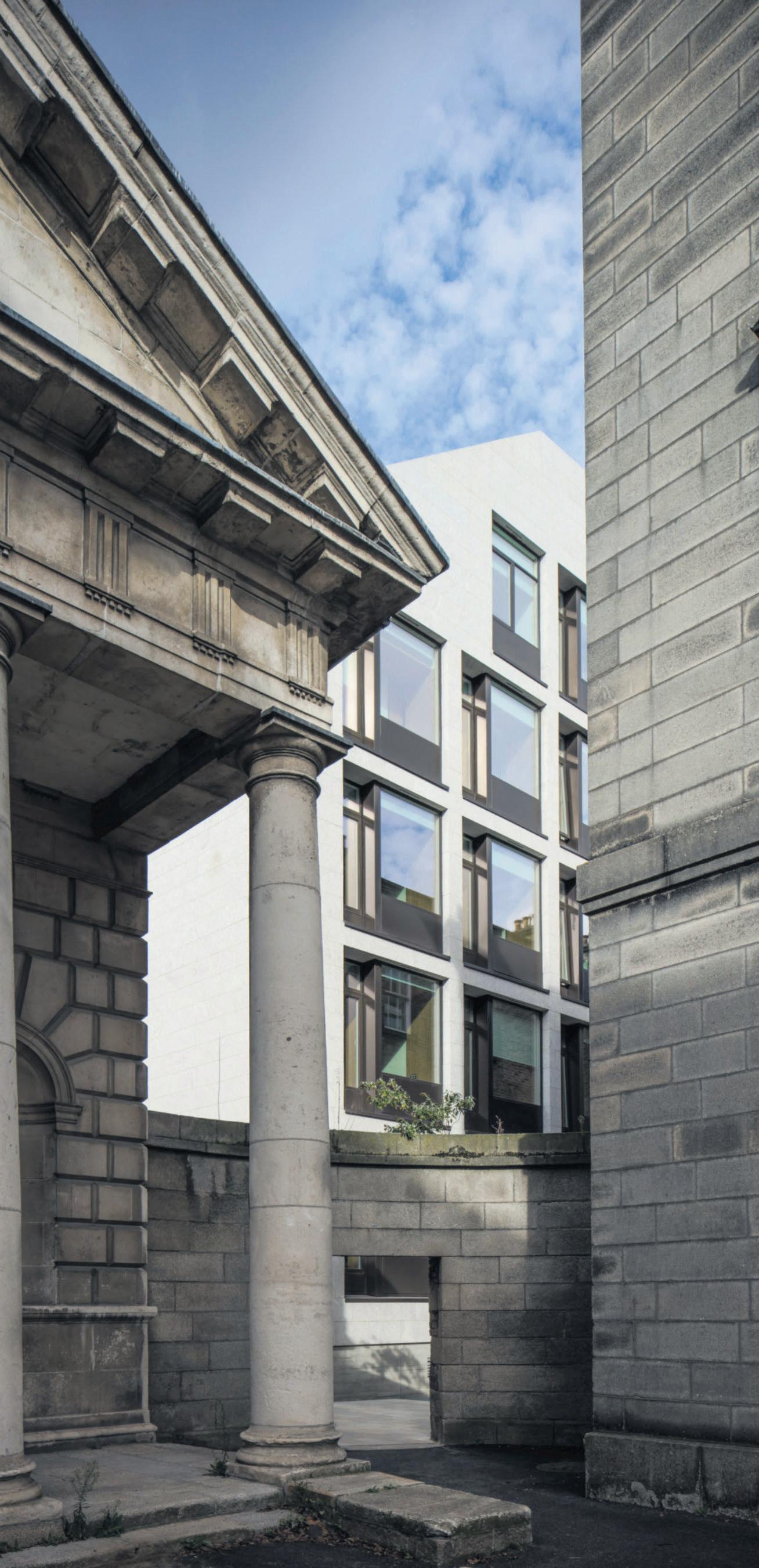
The Graduate Intern for the Disability Service discusses her work to remove obstacles to accessibility on campus.
Clara Roche
EDITOR
For Ciara McGeough, an interest in disability activism was instinctual. She started to lose her hearing at fifteen years old, something she began to realise when she received a B in her Junior Cert music exam. “It’s nearly like hearing through static”, she explains over email. “I hear most things, but in order to understand what is being said, I would have to lipread as well. Or if the person can sign, even better”.
“I was the first person to be exempt from the music listening
Leaving Cert exam paper”, she reveals.
“Through advocating with local senators and the Minister for Education at that time, the State Examinations Committee finally agreed to the exemption of the music listening paper.
That accommodation now exists because of the fight I fought alongside my teachers and politicians.” After that, she became a part of the Youth Advisory Panel in Jigsaw, Ireland’s National Centre for Youth Mental Health. She also frequently volunteers with Barretstown, a camp for children with cancer and other serious illnesses.
McGeough has now assumed a position as the Graduate Intern for Trinity’s Disability Service for the upcoming academic year, having recently completed a Bachelor in Deaf Studies. “When I found Deaf Studies on the CAO, I instantly knew it was the only course I wanted”, she
recalls. “Learning about the history of the Deaf community has been amazing . . . As I only became Deaf as a teenager, I was never exposed to sign language or anything Deaf related until college”. Now, she says, Irish Sign Language (ISL) is her preferred method of communication.
As the Graduate Intern, McGeough feels she can use her own experience to advocate for students with disabilities. One of her responsibilities will be the promotion of the Disability Service and the supports it offers, ensuring each student knows that help is available. “The Disability Service is here for the whole college”, she says.
Whether you identify as disabled or not, she assures, the Disability Service will be able to assess your case and recommend a solution.
“There is absolutely no harm in asking”, she insists.
“The worst that can happen is, they may refer you to another department who can help, so it’s a win-win”.
Last year, the Disability Service relocated to the newly-built Printing House Square, a move McGeough credits as “an amazing addition to the services already provided”. The DisAbility Hub now offers students and societies “accessible spaces” to meet and hold activities within the new development. Already, McGeough has established “strong student partnerships” with Trinity College Dublin Students’ Union (TCDSU), the Central Societies Committee (CSC), and Trinity Sport. “They are all interested and eager to learn about making student life
more accessible”, she confirms. “This is to ensure students feel welcome in all aspects of college life, not just within the DisAbility Hub”.
In particular, McGeough highlights TCDSU Ents Officer Olivia Orr’s expansion of the Ents committee to include a dedicated Accessibilities Officer, a position now held by Charlie Howard. She calls the creation of the position “an excellent step forward for the college community”. In the first week of September, she will train the CSC officers on improving inclusion within societies. “I am really looking forward to being a part of the change in the college community”, she says. She hopes her work will help to secure inclusion “in every aspect of college life, to ensure each student can participate in all parts of their student experiences”.
McGeough also expresses an eagerness to build upon the work of Courtney McGrath, a business and sociology graduate and the first Graduate Intern for the Disability Service. McGrath was responsible for the foundation of the Ability Co_ op, which, according to McGeough, is “a group of students who actively advocate for accessibility and inclusion in all aspects of student life”. Previously, the Co_op has organised initiatives to improve the graduate employability of students with disabilities, and provided awareness and accessibility training to Trinity’s clubs and societies. In her capacity as Graduate Intern, McGeough will be the main staff contact for the student-led group, liaising between the Co_op members and the Disability Service. She references the inclusive student guidelines booklet created by the last Graduate Interns of the Disability Service, and stresses her intention to promote it throughout the college “to ensure all students will have equal opportunities training for inclusion in college life”.
While optimistic, McGeough remains prepared for the challenges she may face as the Graduate Intern. “The sheer volume of resources required to enable staff within the Disability Service to provide the level of support needed to all students can be difficult”, she explains. She emphasises the need for collaboration between the Service and the wider college community, particularly clubs and societies. This, she says, “will help create an inclusive campus for students so those registered with the Disability Service do not feel isolated or confined to the DisAbility Hub”, consequently reducing the strain on the Service. She believes that the anxieties faced by students with disabilities entering the college will be alleviated by “a more inclusive and welcoming environment” within the clubs and societies on offer. “Ultimately, we want to create a welcoming environment, not just here within the DisAbility Hub, but within the wider Trinity community”, she continues. “My role within the Disability Service will help move towards a more inclusive Trinity”.
Students engaging with the Disability Service can look forward to International Disability Week in December, which the Service will celebrate with their annual art exhibition “open to the whole disabled community in Trinity”. As well as this, the DisAbility Hub will offer drop-in groups for students with autism, and another for students with ADHD. The Ability Co_op, meanwhile, are working on a number of
projects, including an “unofficial guide to Trinity”, intended to help students with “various disabilities” navigate the campus, “keeping in mind their sensory needs and preferences”. In the same vein, TCD Sense has recently published a “very comprehensive” interactive map of the campus, highlighting the sensory spaces available to students. The map details features such as the noise levels and capacities of buildings across the campus, and offers

information about the electrical outlets available and whether or not food or drink is allowed.
Already, McGeough’s dedication to making education more accessible for students with disabilities has yielded significant results. As she works to create a more inclusive campus environment, she calls upon students to engage with her efforts towards collective progress. Beyond encouraging students to take advantage of the available
supports, she urges students to get involved with the Disability Service and contribute to the ongoing improvements. She refers to the Ability Co_op as the “perfect example” of a platform through which students can participate: “With students’ own experiences, bringing this to the committee or the subcommittee of the Co_op will help the Disability Service improve over the years to come”.
The University Times Monday 18 September, 2023 7 IN FOCUS
Whether you identify as disabled or not, she assures, the Disability Service will be able to assess your case and recommend a solution. “There is absolutely no harm in asking”.
“
ILLUSTRATION BY NATHAN O’GARA FOR THE UNIVERSITY TIMES
PHOTO: MCCULLOUGH MULVIN
COMMENT & ANALYSIS
Mandela House, 6 Trinity College, College Green, Dublin 2
Phone: (01) 646 8431
Email: info@universitytimes.ie
Clara Roche, Editor
Sáoirse Goes, Deputy Editor
Phoebe Pascoe, Assistant Editor
Alexander Payne, Assistant Editor
Hosanna Boulter, News Editor
Wynslow Wilmot, Features Editor
Sophie Coffey, Opinion Editor
Valentina Milne, Sports Editor
Cleo Daly, Magazine Editor
Emma Fitzpatrick, Magazine Editor
Barrett Ellis, Radius Editor
Ella Hussey, Radius Editor
Joshua Hernon, Political Correspondent
Charlie Hastings, Chair of the Editorial Board
Aoife Kirby, Copy Editor
Sarah McCarthy, Copy Editor
Elizabeth O’Sullivan, Copy Editor
Princess Omozusi, Creative Director
Róisín Newman, Social Media Manager
EDITORIAL: TRINITY IS A UNIVERSITY, NOT A TOURIST ATTRACTION
While the news that College refused to bend to the Protesters’ demands as they blockaded the Book of Kells on Wednesday sparked nationwide debate on news outlets and social media, this should come as no surprise considering their repeated prioritisation of Trinity as a tourist attraction, rather than an academic institution.
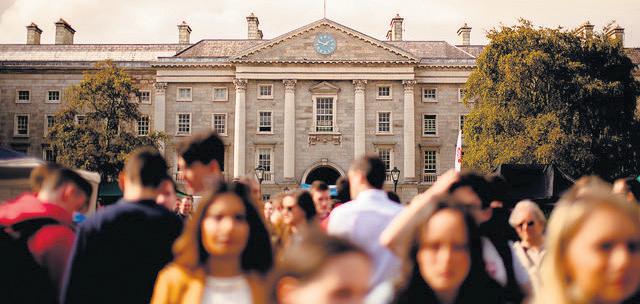
That student interests are not at the top of College administration’s minds is blatantly elucidated through the newly-built state of the art Book of Kells exhibition, while House 6 still remains wheelchair inaccessible. College seems to be ignoring the real needs of students in subscribing to an outdated model of trickle-down economics, the fruits of which seem far from guaranteed.
In a statement condemning the protest, College called the 2 per cent increase “part of a three-year plan that will expire this year and will be subject to review”. On Twitter, former TCDSU President Domhnall McGlacken-Byrne refuted this reassurance, suggesting that College had made the same declaration during his leadership. Despite this, Trinity rents have consistently risen by 3-4% annually for the past decade. Students must recognise the College’s hollow sentiments and empty promises for what they are.
The legitimacy and efficacy of protests such as the Book of Kells blockade is well-documented. In 2018, a similar effort as part of the ‘Take Back Trinity’ campaign contributed to the removal of supplemental exam fees. College must stand behind its students, not cast them as the enemy. Until then, students must continue to take radical action.
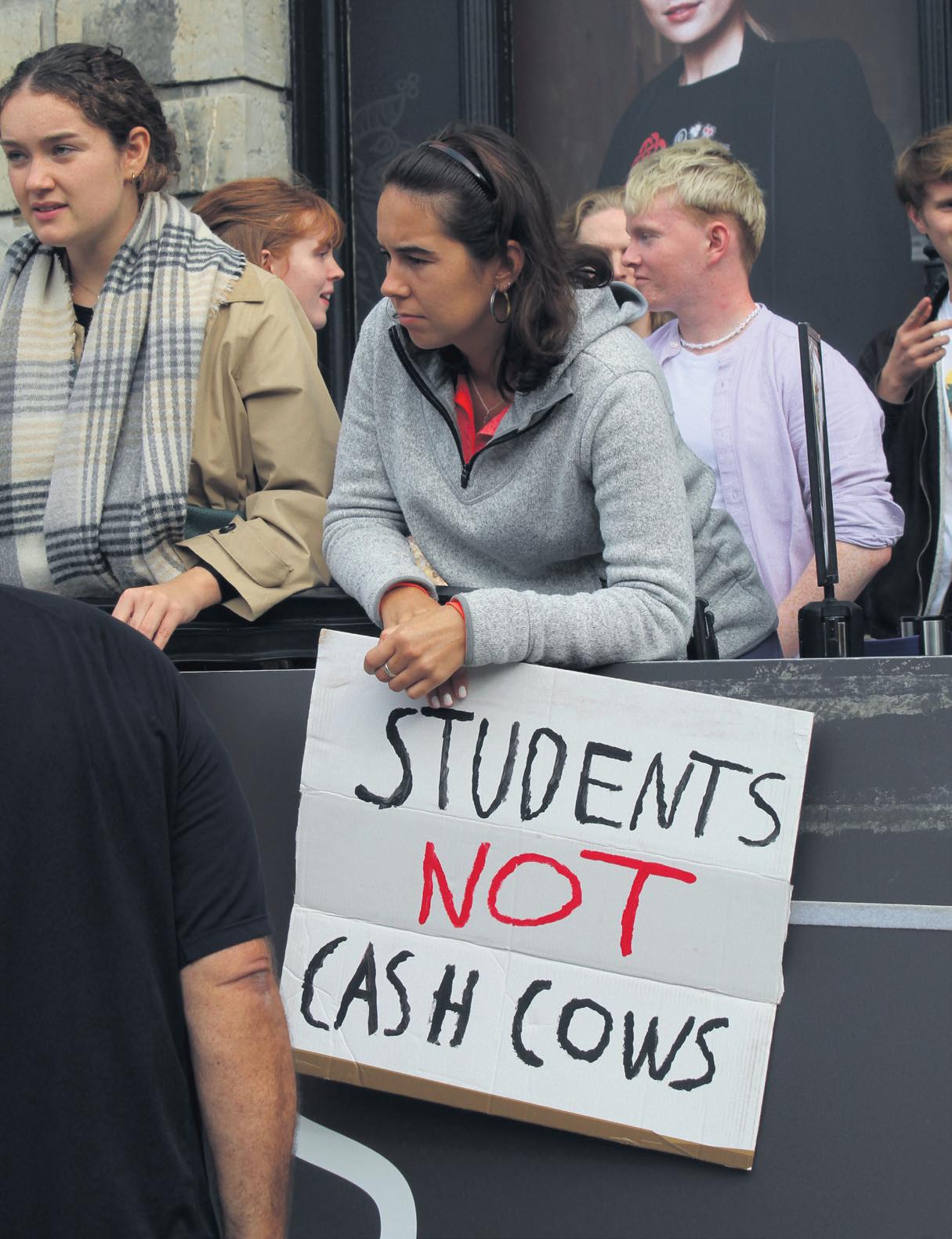
Worrying About Making the Most of Final Year Will Ruin It
Sophie Coffey
The phrase “your college years will be the best of your life” is a familiar one, reiterated by older friends, family and strangers alike. But whilst the remark might be intended to fill a fresher with energy and excitement, I have discovered it has the opposite effect on a student embarking on their final year.
As I begin the concluding year of my undergraduate degree, I am acutely aware of all of the lasts: last module enrolment fiasco, last freshers’ week, last first day of the semester. The clock is ticking and I no longer have the safety net of another term to help me improve a bad grade or decide on a post-college path. The ‘real world’ looms around the corner and its presence grows with every passing week. Thankfully, I still have eight months until I will be forced to face reality head-on. However, my mental countdown has an external manifestation in the form of every well-intentioned reminder to enjoy the limited time I have left.
On a practical level, I have yet to establish how I will make the most of my precious last semesters. Perhaps more importantly, I don’t intend to. I have decided that trying to make my Senior Sophister stage the greatest yet will only generate more stress than success.
Alongside thousands of other students who completed their leaving cert in 2020, I started my course on a Zoom call. If my mid-pandemic first year experience taught me anything, it was that the only certainty was unpredictability. Although it is tempting to demand an incredible concluding year to bid my degree farewell, it seems counterin-
tuitive to finish the freedom of my college lifestyle by spending eight months saying ‘yes’ just for the sake of it.
When graduated adults sigh that they wish they could return to life as a college student, it’s not the assignments or reading lists they envy. In most instances they are referring to the spontaneous social aspect of college life. This dimension of higher-level education has become so infamous as to now be synonymous with the university experience. There are anecdotes of alcohol-fuelled adventures and spontaneous trips. There are last-minute Ryanair bookings one week and the calculation of how to eke out the final cents on a Leap Card the next. There are the annually planned occasions and then the ones that occur by chance. It is the inclusion of these random and impulsive events that has been so crucial to my life in college over the past three years.
Depending on the nature of my post-college plans, my undergraduate degree might be the last time I have such flexibility in my routine. It would be counterproductive to take one of the fundamental benefits of my college experience and accidentally reverse it by determining to attend everything purely because soon I won’t be able to. Far from helping me achieve the ‘final-year-to-supersede-all-prior-years’, overthinking and overplanning the coming semester
will only hinder my enjoyment of it. I expect I will make more of an effort to attend some of the bigger college events or partake in annual traditions this year. However, I will do this by choice and on a case-by-case basis. Grading my years in college by the biggest events I attended would be doing it an injustice. My degree mark will ultimately be etched on a piece of paper, but my college experience will be marked by thousands of oth-
er smaller engravings. There is no denying that I have amazing memories of Trinity Ball and will likely join the nail-biting Ticketmaster queue again in March. When surmising my three years to date, though, it would be a simplification to only reference large-scale occasions. Many of my smaller nights out have been gloriously hedonistic in the best ways possible and I will be forever nostalgic for these. Equally, to reduce my time as a student to Camden Street’s nightlife is neither an accurate or adequate evaluation.
Often, the highlights of my Trinity experience have been occurrences that don’t fit neatly on a calendar. I cannot pinpoint the exact date I first met some of my closest college friends because most of the time it was by chance – a random sequence of events that resulted in our crossed paths. Disregarding these unplanned elements of college life would only hinder my enjoyment of my final year. The societal discourse that insists upon a downward trajectory after college feels ominous and mildly threatening. The prospect “best years of my life” occurring before I’ve reached my mid-twenties is neither encouraging nor realistic. The suggestion appears to be that my final year of college will be my last opportunity for such broadly recognised freedom and fun. I’m no fairy godmother, but I’m confident graduation will not turn me into Cinderella and spell the end of my ability to socialise past midnight.
Final year bubbles with enough pressure without adding to the burden before we have even returned to campus. The countdown until the end of my undergraduate studies is beginning whether I like it or not. It’s up to me whether I try in vain to race against the time slipping away, or whether I’m willing to acquiesce to its sometimes uncontrollable rhythm.
The Beach Read Shouldn’t End With Summer
Phoebe Pascoe ASSISTANT EDITOR
It was May of this year and exams had been over for a week, but somehow I was more stressed than I had been when I still had essays to submit. My phone was ablaze as my friends and I packed to go away, debating whether our bags were too heavy. The most important question though, was about books. “Is four books enough?” I asked the group chat, my bookshelf decanted onto my no-longer-visible bed. We shared the names of the titles we were bringing, and claimed first dibs on what the others’ had packed. Yes, going on a summer holiday is exciting. Possibly just as exciting, for me, is the prospect of the beach read.
The Guardian reports that “there are more books sold in the summer than during any other season”. The term ‘beach read’ implies a frivolity of literature to accompany the levity of summertime, and has often been derided as a frivolous genre, akin to ‘chick-lit’. But if the scope of the tomes my friends and I packed to go away are anything to go by, there is no longer any one thing that links the content of a beach book, if there ever was. Our selections ranged from Trespasses by Louise Kennedy (a heartbreaking
story set in 1970s Belfast, shortlisted for the Women’s Prize for Fiction), to a story of nineteenth century divorce by Henry James, to Eat Pray Love. This wasn’t due to our differing tastes – we traded books all holiday until our copies were as sun-beaten as we were. If the beach read can’t be confined to a singular genre or type, then it needn’t be defined by being read in the summer, either. The beach read is simply about the joy of literature, and should stretch far into autumn.
The key is in the term: what defines a ‘beach read’ is its environment. Usually this means the sea, but a pool or a decent sized Aperol Spritz will do. Really, the beach read is not even about reading it on the beach, but what this implies. It is the mingling of the physical place you are in with the place where literature transports you that is the magic of the beach read.
The idea of the perfect beach read seems contradictory: you are reading something so compelling that even in a beautiful place you’ve been dreaming of for months, you are escaping it entirely. But you are not completely absent, because the environment seeps into what you are reading. The sensory experience of a beach – heat on bare skin, the smell of suncream, the sound of teenagers playing with
a ball – seeps into your reading like salt water curls the pages of your paperback. The beach read is a coalescence of the world of literature and the outside world. It doesn’t distract you from your reading because this is precisely the joy of reading on the beach.
And why shouldn’t this joy be carried into the colder months, when we arguably need it more?
The sea or swimming pool can be replaced by a decent sized lake or a Butlers hot chocolate. Autumn also has plenty for our senses to filter through whilst we read, even if it is just how bitterly cold we are. But who has time to read in autumn? Especially as college students, reading for pleasure becomes an oxymoron once essay titles are foisted upon us or timetables filled again. Part of the joy of summer reading is the gluttony of it: gorging on book after book, pausing only to reapply suncream. But it doesn’t have to be all or nothing. Isn’t that what autumn is all about? It’s a season made up of the in-between. The autumn-esque beach read might be a collection of essays or short stories that you can wolf down in the same time as a chicken fillet roll. Alternatively, carving out the time to read might make reading feel all the more luxurious. Reading is a luxury. But it is one that people are still allowing
themselves despite the cost of living crisis: two-thirds of bookshop customers in the UK view books as good or excellent value for money. As the days get colder and to-do lists get longer, doesn’t that make it even more gratifying when you do find yourself able to bed down under a blanket and let a novel consume you, or simply find a free 15 minutes to sit in the park and read a chapter?
Autumn reading is all the better because it can’t last – just like a day on the beach.
The concept of the beach read also involves allowing yourself to read for fun. The platonic ideal of a beach read is something that wouldn’t be out of place on Jonah Hill’s list of activities his girlfriend shouldn’t partake in. The beach read doesn’t have to be light and frothy, but the point is that it can be – no one is telling you that what you’re reading on the beach isn’t high brow enough. Reading all year round should be seen like this. Not as something that makes you morally superior or that has to require intense use of your brain (although this can be rewarding) but an activity to do for fun. The beach read redefines reading as a glorious indulgence, linked with the best parts of the season it occurs in. The idea that this has to stop when summer ends is simply false.
The University Times Monday 18 September, 2023 8
OPINION EDITOR
I’m no fairy godmother, but I’m confident graduation will not turn me into Cinderella and spell the end of my ability to socialise past midnight.
“
PHOTO BY EAVAN MCLOUGHLIN FOR THE UNIVERSITY TIMES
PHOTO BY ELLA O’BRIEN FOR THE UNIVERSITY TIMES
Run For Your Likes: the Trend of Instagram Fitness
 Phoebe Pascoe ASSISTANT EDITOR
Phoebe Pascoe ASSISTANT EDITOR
When the writer Murakami goes for a run, he is in his “own cozy, homemade void, my own nostalgic silence”. Running on Instagram is a little louder. Nearly 90 million posts are captioned ‘#running’ and I am currently unable to open the app without virtually joining the jog of an enthusiastic Instagram user (whilst holding their phone remarkably still, might I add).
When you’re sat slobbishly on the sofa, crick in your neck and biscuit crumbs in your tea, you might not want to be greeted by a perky influencer shouting: “Run with me!” But apparently we do. The ‘#runwithme’ tag has garnered 171,000 posts. Not since lockdown have I noticed such clamour online for the humble jog. In spring 2020, the number of sedentary adults in Ireland halved. In the UK, the ‘Couch to 5k’ app – which helps new runners build up to a thirty minute run – was downloaded nearly one million times over the pandemic. As movement was restricted, exercise became sanity-saving. Running, specifically, was not only a way to stave off stagnation but an excuse to be outside.
As a sixteen year old girl back in 2020, I was also keenly aware of the other messaging around exercise
that lockdown brought, namely the pressure to ‘glow up’. Youtube channels and social media challenges encouraged highly regimented eating and exercising in order to emerge from a COVID-chrysalis physically transformed. Exercise online is often shrouded in the language of self-care whilst subtly promoting hyper-fixation on image improvement. These recent videos about running seem to be a change in direction.
133,000 people on Instagram are following Savannah Sachdev’s ‘run streak’, which has seen her run on nearly 800 consecutive days. She runs to get pastries, she runs on her period, hungover, or when she’s fighting with her boyfriend. I know this because she shares it. The running videos that Sachdev and
similar content creators post are intentionally imperfect. They start with someone rolling out of bed sluggish and puffy eyed, but end on a runner’s high. Monologues about how running can help you “get out of your mind and into your body” accompany someone lacing up their trainers. The tone is humourously self-deprecating and encouraging.
The handling of food in these videos is also a departure from the norm. They don’t tell you to be ‘strong not skinny’ because they don’t tell you to be anything at all. Videos of longer runs explain how the runner fuels themselves – be it electrolyte gels or Percy Pigs. Food is portrayed as a necessary counterpart to moving your body. It is a complement to exercise instead of a punishment.
Generally, these videos encourage moving at your own pace to make your mind feel a little better. Sometimes they’re the push I need to wrangle a sports bra over my head and go outside. In her book ‘Jog On: How Running Saved My Life’, Bella Mackie describes how she saw running as “something that only happy healthy bouncy people did, not neurotic smokers who were scared of everything”. Running online no longer looks like this. I was never sporty at school and remain utterly uncoordinated. I apparently lost my first ever Sports Day race because I stopped to pick a flower. The other day my dad said he could recognise me running because of my “funny gait”. However, this virtual run club feels welcoming and accessible, even (or perhaps especially) to those of us not athletically inclined. But surely no social media trend can be spotless. Whilst running can hardly be called a trend, this style of documenting it is. Already it is following the same route as any other online phenomenon. There is a potentially corrosive pipeline down which many influencers flow. It starts with a subject: a hobby, cause or person. Posting about this subject attracts followers. More followers allow the account holder to monetise their posts by advertising products. Eventually, the money from these posts surpasses what the poster was making at their previous job, and social media becomes their main –
often only – source of income. Their account becomes financially motivated, leading to more sponsored posts. You might not need to be fast to run with an influencer, but you should really buy, at the very least, a running vest, a Garmin watch, Lululemon shorts and some lurid Hoka trainers.
An Instagram reel can encourage you to ‘get out of your mind and into your body’, but it might also
elderly man running along the river most days and he would always reach out for a high five. Despite our similar routes, our experienceswere undoubtedly different. However enjoyable and well-intentioned these running videos are, they reflect a potentially harmful way that social media integrates itself into our lives and flattens it. If the voices in our heads when we run are gloriously unique, then why do these videos all
want your mind on the products it’s selling you. This is not necessarily malicious, but it doesn’t seem conducive to the “void” that Murakami talks about. Admittedly, on recent runs I have found myself thinking about these videos. Sometimes they spur me on, but the pervasion of the virtual into the physical is not my aim when I head out for a jog.
Trends require homogeneity. It is the sameness of these posts – similar language, clothing and content – that makes them a trend in the first place. But running is an individual act. I used to pass the same
sound the same?
Joyce Carol Oates wrote that just as a runner’s lungs expand, they also experience “an extension of the imagining self”. When our real-world experiences pass through the prism of an online trend, they are distorted by a collective imagination, rather than our own. In this way we risk losing the singular mental joys that hobbies can bring. Even when movements on Instagram seem positive, I think it is worth asking whether it is possible for them to remain so within this structure. Maybe I don’t like being asked to go for a run, after all.
How Airport Delays Taught Me to Slow Down

 Sophie Coffey OPINION EDITOR
Sophie Coffey OPINION EDITOR
Since the lifting of pandemic-induced travel restrictions, I have discovered that I have a very unique gift. Admittedly, this talent is not yet worthy of a line on my CV. However, I have found myself utilising this particular skill so consistently when travelling that I can assert the following statement with confidence: any flight that I am on will experience some sort of delay.
Yep. If you’ve travelled on a flight with Sophie Coffey, you might be entitled to compensation.
Between visiting my family abroad and travelling to the various Erasmus destinations of my friends, many of my flights over the last two years have been solo flights. Now that I type that sentence, I’m wondering if perhaps my penchant for delays and my pattern of solo flights is in fact correlated.
Regardless of my destination, my journeys are never without some adventure. There was the time my pass-
port was cancelled in Valencia, the occasion I was evacuated from the airport in Paris and then the emergency exit incident in Birmingham when my seat simply did not exist. Oh, and that recent IT glitch in the UK’s flight systems… guess who had a flight booked that day! It is perhaps unsurprising, then, that my flight plight has become a standing joke amongst my friends and family. The majority of the discourse around my travel journeys relates to my consistent bad luck. And yet, despite how unfortunate it might look on paper (see my two hour and fifty nine minute delay on a flight that would have resulted in compensation at the three hour mark), in most cases I don’t actually view my delays in a negative light. In fact, I have recently come to the conclusion that
I am a secret admirer of airport delays. This statement tends to surprise people – particularly those who know me. With the obvious exception of my flight delays, I am known for being constantly on the go. Sitting still fits with neither my nature nor my jam-packed calendar. My laptop during a lecture is likely to have 25 tabs open, spanning from Blackboard to Booking. com. These 25 virtual tabs are nothing compared with the 250 mental tabs open in my brain. I work at a pace that is ridiculous in theory and in practice. Throughout the college semester, I am most likely to be in a state fuelled by far too much caffeine and far too little sleep. All of these personality traits seem at odds with my newfound appreciation for an airport delay. But I believe it is precisely this juxtaposition that has led to my admiration of an apologetic airport announcement. After much trial and error it has become apparent that the sole environment which can quash my need for productivity is that of a departure gate.
As I write this, I recognise the slightly manic impression that this gives off. My repertoire of airport experiences has left me pondering not just their compensation efforts but also my own response in each situation.
Ultimately, time spent waiting in an airport is time over which I can exercise no control. Since dashing through an airport can lead to some security questions, the airport environment tends to triumph over my pursuit of productivity.
In an airport I have a neat list of things to do: pass security checks with flying colours and obtain a
one euro bottle of water for starters. Once my to-do list is achieved I look forward to finding a seat near my gate with nothing to do but wait. I am not to be mistaken for an overly patient individual in general, yet a Butlers’ flat white and my kindle is a dreamy combination. Of course after the initial waiting comes the flight itself.
Thousands of feet in the air and the only thing that I need to worry about is which book to read and which overpriced airport snack to enjoy first. It is absolute bliss.
This summer I took my first transatlantic flight. When chatting about
it with others, many expressed empathy regarding my impending lengthy flight time. By contrast, I viewed my inaugural long-haul flight with almost as much excitement as I did my actual holiday. Seven hours to read my book and watch a film? Take my money Aer Lingus! I have become so accustomed to a lifestyle of bouncing from task to task and travelling from one commitment to the next, that moments of delay in the airport feel like blissful little pockets of enforced breaks. Time has become a scarce commodity for me due to my own overachiev-
ing efforts. Airport delays which, in theory, steal time have ironically given me the opposite. Delayed flights have inadvertently allocated me time that is mine and mine alone.
Each time that the captain declared arrival was nearing I felt a hint of disappointment. Landing would inevitably mean hitting the ground running (and not just because of a Ryanair pilot). Disembarking the plane meant preparing for business as usual. This semester, I am aiming to leave my heavily packed baggage at the gate and take a lighter load on board. After all, booking flights because I’m in need of a quick break sounds like an expensive habit, regardless of how many flash sales Ryanair offers.
Now I just need to work out how to achieve this level of contemplative tranquillity while awaiting a delayed Dublin bus.
The University Times Monday 18 September, 2023 9 COMMENT & ANALYSIS
“
However enjoyable and well-intentioned these running videos are, they reflect a potentially harmful way that social media integrates itself into our lives and flattens it
“
The sole environment which can quash my need for productivity is that of a departure gate.
“
Delayed flights have inadvertently allocated me time that is mine and mine alone.
PHOTO: GETTY
PHOTO: ECCIRELAND.IE
COMMENT & ANALYSIS
Perfectionism is No Excuse for Workplace Bullying
Alexander Payne ASSISTANT EDITOR
“Alex!” shrieks the chef plating the main courses on the pass.
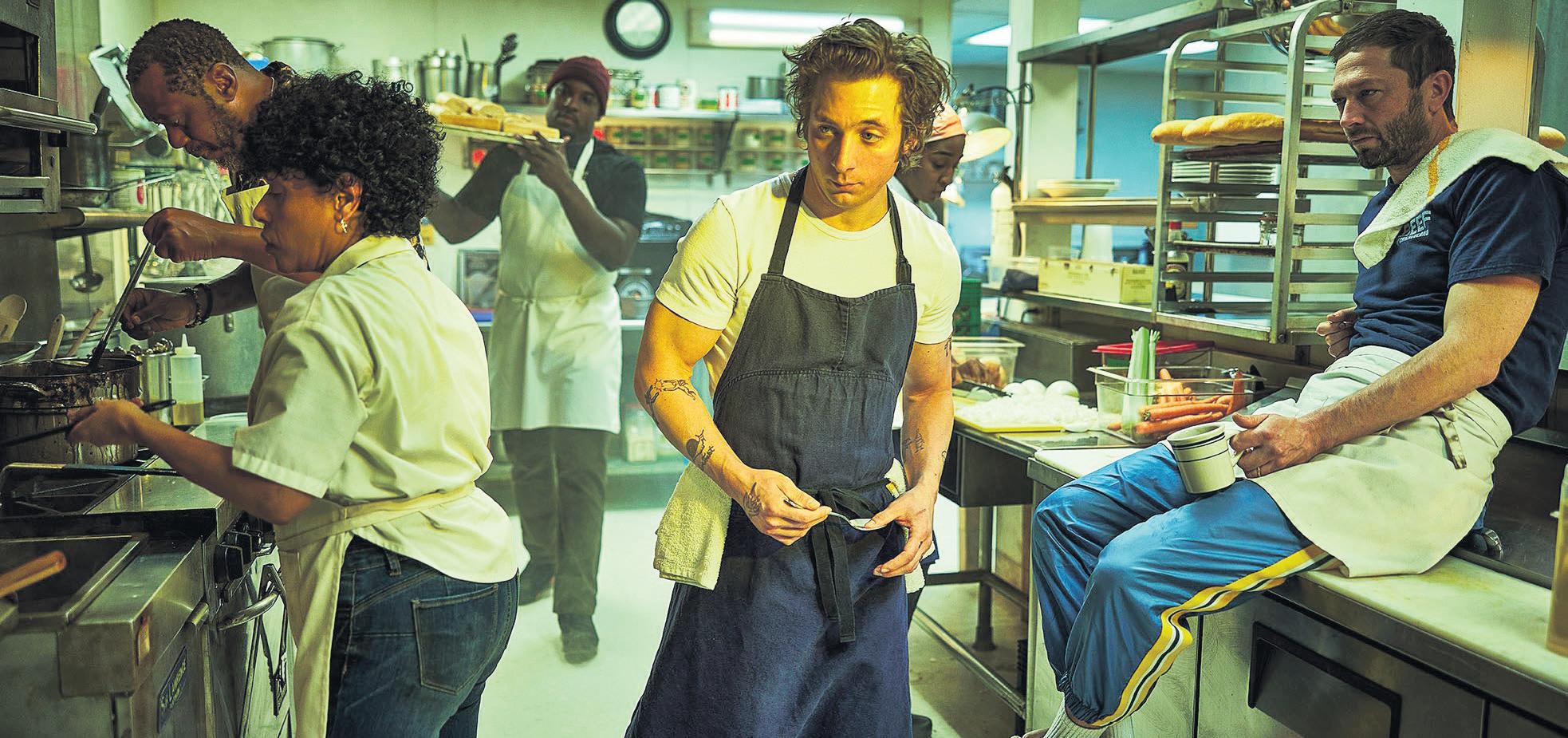
“This courgette is over-fuckingcooked.” Before I can lift my eyes from my dozen-or-so pans of reducing sauces, glazing vegetables and simmering purées, I feel the hot splat of “over-fucking-cooked” courgette as it disintegrates on my left cheek. I look up to see the steaming, accusatory eyes of the vegetable-thrower. I didn’t even cook the courgette… 69% of my peers – full-time students – work over the summer and 57% do so during term-time due to the ever-increasing cost of education and living. Workplace bullying and harassment scandals seem to break every other day. Ireland’s Health and Safety Executive (HSE) is currently being investigated by its own National Investigation Unit due to 83 workplace bullying claims that supposedly only represent the “tip of the iceberg”. A study carried out by the University of Galway in 2020 estimated the economic value of lost productivity from workplace bullying to be €239 million.
McDonald’s outlets in the UK are currently facing a string of sexual abuse, harrassment and bullying allegations. Also in the UK, the nature and extent of workplace bullying in the House of Commons was described as “disturbing” in an independent review in 2019, and “toxic” in a recent staff survey.
Earlier this year, Dominic Raab, former Deputy Prime Minister and Justice Secretary for the Conservative government in the UK, an-
nounced that he is to stand down as a Member of Parliament (MP) at the next general election. Prior to this, on April 21st, Raab resigned from his cabinet positions after a bullying allegations report found that he had, at times, behaved in an “unreasonably and persistently aggressive” manner.
This, along with revelations in the New York Times on April 20th concerning the behaviour of Barbara Lynch, an award-winning Boston chef and one of Time magazine’s 100 most influential people in 2017, have caused me to reflect upon my own experiences of working in a hostile environment. It is in the allegations against Raab and Lynch that I first saw similarities. In November 2022, the Guardian reported that sources within Raab’s department, the Ministry of Justice, described him as “demeaning rather than demanding”, “rude and aggressive”, “unprofessional” and a “bully”. There were also various reports suggesting that senior civil servants had warned him about his behaviour, and offered other civil servants a departmental
move, having been exposed to Raab during his tenure at the Ministry of Justice.
Meanwhile, in the New York Times, Lynch was accused by staff of being “physically and emotionally abusive”, apparently threatening to push someone’s head through a window during an “expletive-laced confrontation”. She supposedly got so frustrated with a server for allowing a table to just order starters and no mains that she “dragged her out from behind the bar into the crowded dining room”.
At one restaurant, which shares its name with a certain savoury cracker, I endured my fair share of erratic behaviour: the courgette to the face; plates smashed in front of me; constant public belittling; the head chef, like a pernicious disease, following me around the kitchen whispering unsweet nothings in my ear – “you’re a dirty cunt” – over and over. For the latter I had made a bit of a mess of my chef whites whilst peeling just over 120 red peppers. I kept myself pretty clean after that encounter. So – fair enough?
Witnessing the insidious treatment of younger staff, however, affected me more than any of the events listed above. I entered this particular kitchen at the age of 24 and had already spent five years in various other, more hospitable restaurants. I was not prepared for the sheer brutality of between 80 and 110 hours of work per week – work that was defined by heat, anger and focus. But I was already relatively durable compared to a 16-year-old
apprentice working their first ever job. From day one, it was made very clear that new employees were apparently incredibly lucky to have been given a job. This particular kitchen is hugely well-respected, not just in the UK, but around the world. It opens doors and garners respect for any chef that works there. Unfortunately, the senior staff use this reputation to enforce and justify rule by fear – saying sorry for your mistakes is not good enough; if you want to work here, if you think you are capable, then this is how it is.
A young chef, in dreamland at having landed an apprenticeship at this particular establishment, might seek to imitate, or even emulate, the behaviour and actions of more senior staff. A restaurant with a proven history of exceptional food must contain the best practices for producing such culinary delights, no?
Okay, it produces good food, teaches its chefs a fantastically wide range of skills and gives those that leave an ability to work at high-level restaurants elsewhere. But, as sadly happens in many other workplaces, its toxic treatment of staff has become cyclical – the head chef when I was there was in their late twenties, having joined the restaurant as an apprentice when they were 15. They must, in my opinion, have been treated poorly. They then went on to become the head chef of one of the UK’s most famous restaurants and won national and international cooking awards. I imagine that they justify their treatment of others by
seeing their success as the product of a harsh, demanding and ultimately abusive work environment – the conditions under which they now rule their kitchen. “If you want to be successful like me, this is how things are”, is what I would imagine to be their justification.
It made me sad to think that young apprentices were accepting and learning from their poor treatment, all because they were all eager to succeed and impress those above them. Some more established figures would stand up to this treatment but would instantly be made to feel insignificant through an ensuing public argument that became very personal and petty. At the end of enduring a shift of this treatment, those dishing it out would then throw a supportive arm around the young apprentices, saying that they were only doing this to make them better, to condition them – gaslighting their anxieties, stresses and feelings of inadequacy.
There was one incident that was particularly revealing about the attitude of the senior team. During the morning section meeting, led by the Executive Chef, I overheard them reading out a reply to a job offer they had sent out to a talented chef.
I can’t remember the exact wording, but they had rejected the job offer due to the treatment of staff they had witnessed during their trial. This was met with resultant guffaws and cries of: “what a pussy”, “that’s so fucking wet” and “clearly doesn’t want to be a proper chef”.
Other restaurants I have worked in are not so harsh. If you are slow or getting things wrong you might end up having a chat about how to speed
things up and focus better on your jobs. There is no need to see persistent aggression as the only way of extracting better performance – yes, there is an urgency and level of focus required to work in some kitchens and businesses, but the necessity of these requirements can be made clear without an explosion of rage. I was always tempted, however, to have some level of sympathy with those enacting harsh treatment. They themselves are under huge amounts of pressure to maintain standards – gaining, and retaining, a Michelin star enables you to effectively double your prices. They themselves may be facing bullying by the owners or from others more senior. Who knows what may be going on in another’s personal life?
The demands naturally create a fraught working environment, and the best chefs are often those that are the best at dealing with those pressures. “Panicking doesn’t get you anywhere. If you need to take an extra ten seconds to finish that dish, so be it. Just don’t be so fucking slow next time”, as I was once told.
But, some of the worst chefs or bosses (to work for, at least) hide behind a fanciful cloak of “perfectionism” – Barbara Walsh, for example – in their pursuit of exceptionalism. Dominic Raab made no apologies for his behaviour, other than that he believed he created “good government” from his instilled conditions of “pace, standards and challenge”. “Sorry if you can’t hack it, but clearly none of you understand what it takes to be great” – presumably. At least McDonald’s possess the awareness to admit they have “fallen short”.
This Year Will Not Be Quiet: Direct Action and the PWO’s Year Ahead
Jeffrey Seathrún Sardina CONTRIBUTING WRITER
It’s time to set expectations: this year will not be quiet.
Trinity’s PhDs are almost universally paid 22% below minimum wage – or worse. Despite endless litanies of “diversity and inclusion” from College, PhDs have no maternity leave. No paternity leave. No guaranteed sick leave. No right to a place to work on campus. No mediation in the case of workplace abuse.
No sufficient support for disabled PhDs. No workers’ rights of any form – which means that non-EU PhDs have significant barriers to just living in Ireland, let alone travelling to conferences that are a foundational element of their research.
In the middle of a cost of living crisis, College has hiked the rent of campus accommodation by the maximum legally allowed amount.
Yet this same college accommodation was already vastly unaffordable, and Trinity’s PhDs below-minimum-wage pay for PhDs means that
most PhDs in College accommodation will see the vast majority of their stipend taken for rent alone. While many supervisors and academics in College support us – something I am eternally grateful for – it is exceedingly clear that College as an institution simply does not.
Sadly, Trinity has not meaningfully acted on these injustices even after years of PhD and postgraduate campaigning. They did not act after two massive national protests last year. They did not react after the publication of PWO’s Fair Postgraduate Researcher Agreement (FRA). They did not act on it after a PWO open letter addressed to them gained thousands of signatures.
Trinity knows the problem. They know it’s not right, and still they do not act. Let that sink in.
Decisions made coldly and “pragmatically” by College management have enormous consequences in the lives of PhDs. Unpaid hours and denial of pay rises in the midst of inflation can mean the difference between paying rent and facing arrears, or being able to buy food and going without. Unfortunately, this is not the struggle of PhDs alone
– many post-docs, early-career researchers, and other precarious staff are equally harmed in this way by the cruelty College attempts to market as “pragmatism”. Unsurprisingly, this system of neglect also massively undermines undergraduate education. Only a
us cannot choose what we teach – or even if we want to teach or not. Forcing us to teach subjects we often have little or no experience in, and not paying us to prepare or learn then, Trinity has set up a system that fails undergraduates’ needs at a mass scale – all while touting the
countries’ PhD programmes.
So what do we do? We have one option left – one we only take as an absolute last resort. We hit where it hurts.
They want to impoverish our members and deprive undergraduates of the quality education they are paying for? We target the Book of Kells! We need to be able to escalate to protests, flash walkouts, occupations, blockades, pickets –strikes even! And we need to cover Trinity with so many posters that they can no longer ignore us – and so that not a single person in our College community does not understand why we have to act, and why we have to act now.
make College function every day. In a way, that selfsame Book of Kells represents everything that College has done wrong – serving tourists rather than respecting students and favouring the corporatisation of education over the rights of workers.
So no, this year will not be quiet.
And yes, we will stand up, we will take direct action, and we will tell every single one of our members one thing Trinity has never said in sincerity: you are awesome! You are worth fighting for! You are worth Unionising for! You are worth the dignity of a living wage! You are worth all of your full rights! And you are absolutely, without a doubt, worth being here!
fraction of the hours spent marking assignments are actually paid, and even in a rush PhDs often find upwards of 10 or even 20 hours of unpaid work is required to mark assessments. As I am sure you can imagine – this excess of unpaid work does not lead to quality assessment or marking. It hurts undergraduates each and every year.
Worse still, PhDs are almost never paid for time preparing for demonstration and teaching, and many of
value of the education they offer.
The point is this: our struggle is not just about researcher rights. It’s also about the rights of undergraduates to a proper, quality education. Undergraduates pay extortionate fees to attend Trinity – the highest fees in the E.U., in fact. They deserve better than underpaid demonstrators who are not given the resources to mark assessments or prepare sessions in full – an issue that is substantially less common in other E.U.
When the cost of living threatened PhDs, and when systemic neglect of casualised teaching staff threatened undergraduates, Trinity did nothing. But as recent events have proven – when we take direct action, or when we shut down the adored Book of Kells – Trinity bends over backwards and does anything to protect and dignify it. They pander to tourists over their own employees, craving to protect their international image rather than those who
That’s why we say it’s time for change. Not only that, but it is time to force change. It’s time for a year of action, of dignity, of success, and of the sort of strikingly radical optimism that mass movements bring.
And if Trinity, or if Provost Linda Doyle, do not like that – then I kindly welcome them to the PWO’s negotiating table. Provost, you know our demands – are you ready to meet them?
The University Times Monday 18 September, 2023 10
“
I was not prepared for the sheer brutality of between 80 and 110 hours of work per week – work that was defined by heat, anger and focus.
“
It made me sad to think that young apprentices were accepting and learning from their poor treatment, all because they were all eager to succeed and impress those above them.
When we shut down the adored Book of Kells – Trinity bends over backwards and does anything to protect and dignify it.
“
PHOTO: FX NETWORKS
Young People Need to Know the Warning Signs of Oesophageal Cancer as Cases Rise in People Under 50
Megan McAuley
CONTRIBUTING WRITER
Most people with oesophageal cancer are diagnosed in their sixties and seventies. However, an increasing number of people below the age of fifty are being diagnosed with the disease, which is often referred to as a ‘silent killer’. Although many people will have heard of oesophageal cancer, few can recognise the symptoms before the cancer is at an advanced stage. For this reason, younger people who are diagnosed with oesophageal cancer generally present to
medical professionals with a more advanced form of the disease in comparison to older people.
The oesophagus – where this cancer is found – is the muscular tube connecting the mouth, throat and stomach. Oesophagal cancer develops when cells begin to grow uncontrollably, and ultimately form a tumour. The increasing cases of this in younger people is possibly due to changes in lifestyle over the last few decades, namely poor diet and obesity, alcohol consumption and smoking. Each of these factors can increase someone’s risk of developing this disease. The Irish Cancer Society’s website advises that the risk can be reduced by eating a diet rich in fruits and vegetables, exercis-
ing regularly, limiting alcohol consumption and not smoking.

An issue for people of all ages is that they are being diagnosed with this cancer at a late and incurable stage. This is because the tell-tale symptoms – difficulty swallowing, heartburn, chest pain/discomfort and persistent coughing – are not normally associated with cancer. People overlook these signs and do not visit their GP. Additionally, unlike breast and prostate cancer, there is no program to screen the general population for oesophageal cancer. Screening is only available for people who have a precancerous condition, Barrett’s oesophagus, as these individuals are more likely to develop oesophageal cancer.
Without a screening program for the general population, it’s absolutely critical that the public is aware of the early warning signs. Early detection of cancer is the key to curative treatment. We cannot overlook potential symptoms. The available treatments for oesophageal cancer include surgery to remove part of the oesophagus (oesophagectomy), chemotherapy and radiotherapy. Unfortunately, these options can have a substantial impact on the quality of life of people with oesophageal cancer.
For example, undergoing an oesophagectomy requires you to re-learn how to eat afterwards. Even though the current treatment approaches are aggressive, they still have limited success as only 1 in 4 people in the Republic of Ireland will survive for 5 years past their diagnosis. This makes diagnosing early – which requires increased
awareness of symptoms – essential.
There is hope, however, for those who are facing an oesophageal cancer diagnosis. Huge amounts of research are underway to find new treatments. In the last 10 years, the Irish Cancer Society has invested over €30 million into worldclass cancer research. This investment has driven considerable improvements in cancer screening and prevention, as well as increasing patient access to clinical trials through supporting Cancer Trials Ireland.
The Irish Cancer Society is currently funding exciting research at Trinity: I was awarded one of the two 2022 Translational Research Scholarships, my research will investigate a new treatment for oesophageal cancer. The project is supervised by Dr. Vincent Kelly of Trinity Biomed-
ical Sciences Institute, and Prof. Jacintha O’Sullivan of Trinity Translational Medicine Institute, who leads the largest specialised oesophageal cancer research group in Ireland.
The work in Trinity College Dublin will build upon a treatment developed by Mirai Medical, a Galway-based medical device company, called electroporation therapy, which selectively targets cancer cells (resulting in fewer side effects and damage to healthy tissue than chemotherapy). My research incorporates mRNA technology (similar to that used in the SARS-CoV-2 vaccine) with the goal of encouraging the patient’s own immune cells to destroy the cancer cells (see the image below).
The difference between treatable and terminal oesophageal cancer is as simple as knowing the early warning signs and visiting your GP. Despite innovative new work in the field, there is no substitute for knowing the symptoms and catching cancer early.
Special thanks to the Trinity St. James’ Patient Representative Group and independent patient advocates for their contributions to this article.
This work is supported by the Irish Cancer Society Research Scholarship CRS22MCA. The opinions, findings and conclusions or recommendations expressed in this material are those of the author and do not necessarily reflect the view of the Irish Cancer Society.
Trinity’s Summer and Graduate Internship Programme is a Necessary Shift in Supporting the Needs of Disabled Interns
Declan Treanor
CONTRIBUTING WRITER
Trinity is championing inclusivity and professional growth with its Summer and Graduate Internship Programme, an initiative tailored for disabled students. Aimed at bridging the gap in unemployment rates among disabled individuals in Ireland, the program sheds light on the vast untapped potential within our disabled community.
The high unemployment rate among disabled individuals in Ireland is not a reflection of capability but opportunity. Trinity’s Summer and Graduate Internship Program is intended to be a bold step towards changing this narrative. Collaborating with various Trinity Academic Schools and Professional Services like Student Services, Sports, the Creche, TAP, and Trinity Trails, the program offers disabled students a chance to gain hands-on work experience, thus bolstering their employability. Naz Velic, Trinity Sport Inclusion Officer, stated, “Trinity Sport were delighted to welcome an intern as part of the Disability Service Summer and Graduate Internship program to support the development of employment opportunities for those with a disability. It was great to have student insight to ensure we are striving to make our services, programmes and facilities as inclusive as possible which is in line with the strategy for sport and physical activity. We are extremely excited to support this program
going forwards”. Trinity’s program offers disabled students a chance to gain hands-on work experience, bolstering their employability.
Testimonials from those involved with the programme demonstrate the importance of schemes such as this. James Burrows, a Sports Intern, shared his transformative journey: “From leading the establishment of a mixed ability rugby team in Trinity to the development of social GAA and producing accessible website material, my experiences and accomplishments were wide-ranging. Most importantly, he hopes to help “students currently feeling isolated in university. If my contributions end up helping just one person engage with sport so that they feel more hopeful about their day-today experience, then truly I think it will have been worth it”.
Faolan Doecke Launder, a TCD Sense Intern, also found the experience an “opportunity to develop my unique set of skills and hone in on my strengths. The welcoming and constructive working environment encouraged me to look beyond doable and push into the realms of incredible”. The experience was a lesson in “how powerful community can be. Working with many students and staff, towards many goals of varying objectives, all geared towards the same direction of creating a better college community for all. I learned lots about myself, about how my skills in information design, collaboration and teamwork are unique, and under the right conditions I was able to flourish better than I had at any other time in my life for a project of such scale”.
The program stands on five primary objectives: empowerment, enhanced employability, inclusive environment, networking opportunities and recognition. These are achieved through offering practical experience, sessions focused on CV building and networking, sensitivity training sessions for staff and celebrative achievements through testimonials and certificates.
The program’s success lies in its comprehensive approach. From securing internships across a diverse range of sectors to organising professional development workshops, the emphasis is on holistic development. A unique aspect of this program is its peer mentoring, connecting interns with experienced mentors from employment areas, facilitating a seamless transition into professional environments. A week-long orientation session was hosted by Jack Kavanagh and Karl Thomas, both disabled graduates of Trinity and now working in leadership developments. A key part of this week was the development of inclusive workplace profiles. Kavanagh, a consultant to the internship programme, adds, “The service empowered and supported me. The program is innovative and sets a new pathway for those previously underserved in the workplace. For Trinity, it’s a statement of values meeting action to create meaningful opportunities”.
In addition, Dr. Kieran Lewis, TCD Sense Lead had five interns working in his team this summer, and says that the programme “demonstrates our commitment to … fostering an inclusive space for staff and stu-
dents, to collaborate, develop and hopefully thrive. The contribution of the interns to the projects and initiatives, as well to the positive dynamic in the office this summer, has been enormous”.
The Inclusive Workplace Profile, curated by the Trinity Disability Service, represents a paradigm shift in understanding, supporting, and accommodating the needs of disabled interns. It addresses an often overlooked element in workplaces: the personalised requirements of every disabled individual, which can differ vastly from one person to the next.
Every disabled individual has a unique set of requirements, and it is essential that programmes such as Trinity’s capture these nuances, giving a comprehensive view of each intern’s specific needs, fostering an environment that supports individualised accommodations. Further, effective communication is key not only to meeting these requirements but also forms the cornerstone of any thriving workplace. By providing staff members with a detailed profile, potential misunderstandings or miscommunications can be avoided. Staff members are better prepared to offer tailored assistance, ensuring that the interns receive the support they need to succeed. Further, having a clear understanding of an intern’s needs beforehand allows employers and colleagues to be proactive, rather than reactive. This means accommodations can be set up before the intern starts, making their integration into the workplace more efficient.
When an organisation takes tan-
gible steps, like adopting the Inclusive Workplace Profile, it showcases a genuine commitment to inclusivity. This is important to build trust among disabled interns as they feel valued and understood, leading to higher job satisfaction.
The profile is also an educational tool. For many employees, it might be their first interaction with detailed, personalised information about the needs of disabled individuals. This fosters empathy and broadens understanding, laying the groundwork for a truly inclusive workplace culture. It is essential to educate the workforce in this manner.
As interns use the profile and provide feedback, organisations can consistently refine and enhance it, ensuring that it remains relevant and effective in addressing the ever-evolving needs of disabled individuals. This continuous improvement is key in programmes intended to provide support in this manner.
The adoption of the Inclusive Workplace Profile is not just a procedural step – it signifies a deeper commitment to inclusivity, understanding, and personal growth. As workplaces become increasingly diverse, tools like the profile will play a pivotal role in bridging gaps, fostering understanding, and ensuring that every individual, irrespective of their abilities, has the opportunity to shine. It also stops employers constantly asking disabled employees to explain or justify their needs.
Trinity Development and Alumni’s Rosin Cody, Alumni Giving Manager remarked that the reflections
“not only celebrated the achievements but also underscored the immense potential of this initiative as it evolves”.
Breda Walls, Director of Student Services, echoed this sentiment, noting, “we are committed to not only continuing but also expanding on this unique development, ensuring that our future endeavours are even more impactful”.
The outcomes of the Summer and Graduate Internship Program are not limited to individual growth. They resonate with families, peers, and the wider community. Through the program, the college aims to enhance the professional prowess, confidence, and networks of the disabled students, ultimately enriching the broader campus community. Outdated employment programmes nationally that receive vast sums of state money need to review their ways and the government needs to refocus its effort to look at other ways to build ability with our disabled graduates.
As we reflect on the current accomplishments and the transformative nature of the disAbility Summer and Graduate Internship Program, our vision for the future remains expansive and ambitious. Our mission to enhance employability and to craft an inclusive society doesn’t end with a successful internship term. It is a continuous journey that demands evolution, expansion, and further commitment. Our future plans involve doubling the number of internship placements by the next academic year and continuing to evolve the program based on feedback from participants.
The University Times Monday 18 September, 2023 11 COMMENT & ANALYSIS
“
Without a screening program for the general population, it’s absolutely critical that the public is aware of the early warning signs. Early detection of cancer is the key to curative treatment.
PHOTO: ANDRES SIMON
SPORT
DUFC Conquers American Competition on Pre-Season Tour
Valentina Milne SPORTS EDITOR
Trinity’s Dublin University Football Club (DUFC) has returned from their pre-season tour of the United States with their head held high, having secured victories in all four of their matches, despite the sweltering 40 degrees celsius heat. Most notable effort goes to their remarkable triumph over Navy’s Men Rugby, the reigning National Champions, in a match that displayed the skill and spirit that DUFC so readily bring to every match. Their success on this tour was no accident. The team dedicated their entire summer to rigorous pre-season training, with a particular focus on injury prevention. Strength and Conditioning Coach, Ian Hirst, is guiding the team through state of the art injury prevention measures, leaving them in the best position for the upcoming season. He states “the beginning of the season is always when the most injuries happen if you haven’t prepared and trained carefully.” This strategic approach will ensure Trinity’s DUFC can continue to compete at the highest level.
The first set of matches were against Ohio State and University of Indiana. After a couple days ac-
climatising on American soil, Trinity’s DUFC took both games in their stride, easily defeating their oppo-
nents 94-3 and 79-10 respectively. Both teams were in very different stages of their development com-
Trinity Women’s Rugby Team Sparks Pre-Season Excitement
 Valentina Milne SPORTS EDITOR
Valentina Milne SPORTS EDITOR
The beginning of the Dublin University Women’s Rugby Club (DUFC) season is fast approaching as their first fixture is set for September 17th. Pre-season training is in full swing, with Head Coach Andy Adams harnessing his wealth of knowledge and experience to shape this remarkable team. Their first open training session welcomed 30 new postgrads, keen to showcase their skills. Assistant coach and former vice-captain of Trinity’s 1st XV, Eleanor Furlong reports that, “it’s a very exciting year ahead for us as a team and we are looking forward to being competitive, learning lots and most importantly having a lot of fun!”
Last year’s success was reflected throughout the season as Trinity Women’s Rugby consolidated their
“
pared to Trinity, but a worthy win nevertheless.
Then came the standout match of the tour which was undoubtedly their clash with Navy Academy. Facing the defending national champions was no small feat, but DUFC rose to the occasion, showcasing their prowess and dedication. Seven - five down in the first 45 minutes, the team managed to fight their way back to win 38 - 14, a gratifying win for all. Head Coach
Tony Smeeth reflected on the match afterwards, stating, “I was so proud of the lads for sticking it, it was a full total squad effort. Being down in the first 45 minutes, I thought we were gonzo but led by the inspirational captain Diarmuid McCormack, we pulled through”.
The final match to seal their win-
ning streak in America was against Army Men’s Rugby. Despite freak conditions of thunder and lightning, both teams rallied, eager to play. Yet another remarkable victory from Trinity, beating them 38 - 7. These matches are a fine display of sporting talent and their advent in College Park is widely anticipated.
As the sun sets on their American adventure, DUFC can reflect on their performances with a sense of pride knowing their dedication and hard work has paid off. Their successful pre-season tour has set the stage for what is going to be an exciting season ahead.
Supporters eagerly await first kick-off, and with the determination from this tour carried through, the team is poised to deliver some thrilling performances.
Men’s Basketball Reigning Champions Seek New Talent
spot in Division 1. The squad is moving from strength to strength, led by the incredibly motivated captain, Jillian O’Toole. As an influx of newcomers and compelling talent begins, this upcoming season’s prospects are promising.
Andy Adams reflects on the support felt by Trinity’s rugby club and his co-coaches Kelvins Karani and Eleanor Furlong. Their undeniable determination to build on the ever-in-
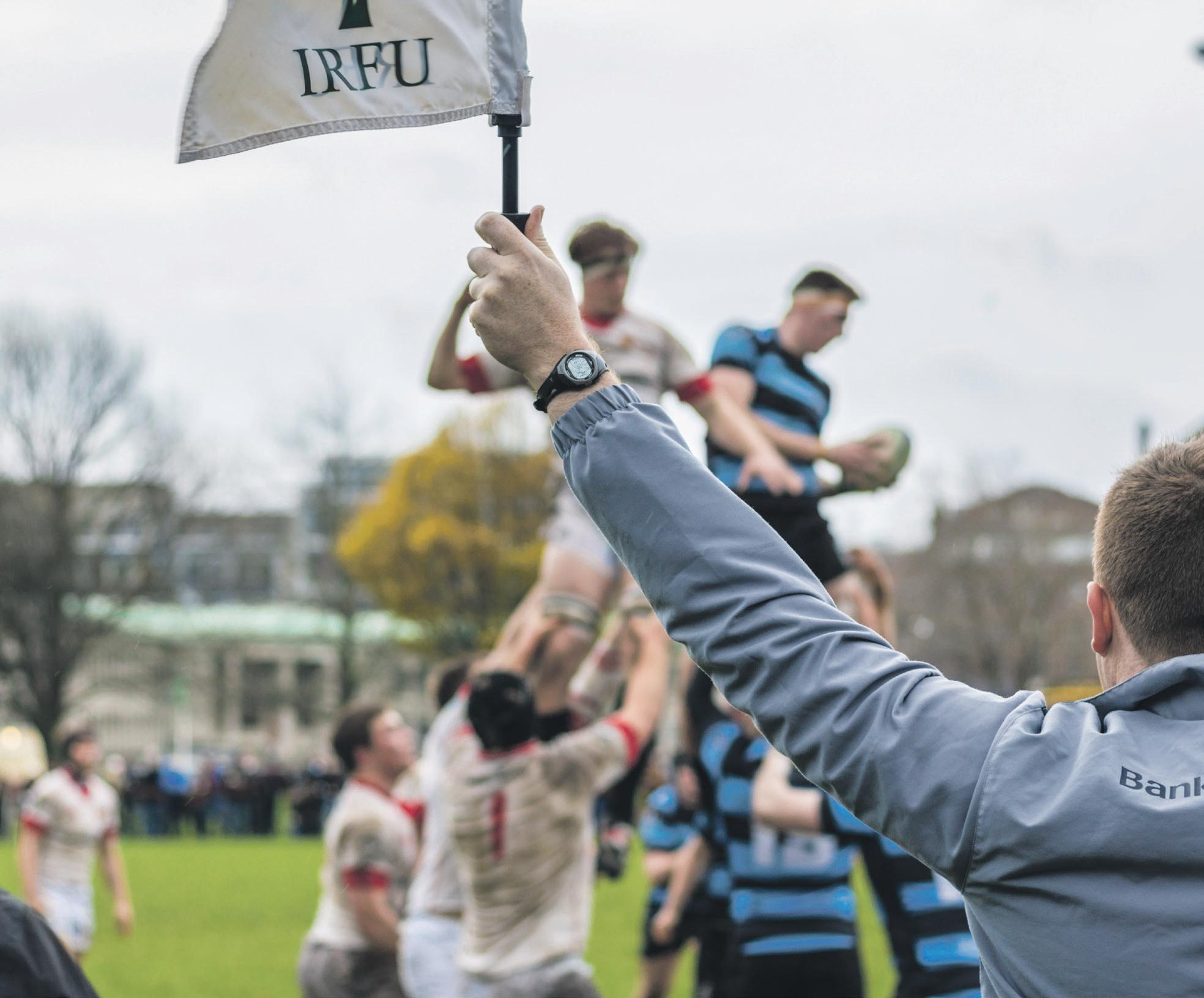
creasing interest that surrounds women’s rugby is tantamount to the passion of the squad and the successes that follow.
This season, keep your eyes peeled for the exhilarating performances from this team. Colours, the inaugural Oxford battle, and more will face Trinity Women’s rugby in the coming year. Anyone keen to try out is encouraged to join by the welcoming community created by such a driven club.
On the back of last season’s historic win, Trinity Men’s Basketball moves from strength to strength. As the upcoming season approaches and the search for potential talent begins, the future of the club holds promising possibilities.
Trinity Men’s Basketball did the unimaginable last season, winning the ‘Quintuple’ and securing assured notability in the club’s history books. With five trophies under their belt, the Men’s Varsity has been promoted to Division 1 for the upcoming season, a showcase of the
finest sporting talent.
It is no secret that Head Coach, Shane Maughan, had a significant impact in the success of last season. Formerly in Division 3, the club went from strength to strength with the support and experience of Maughan, climbing their way up to their current spot in the top league.
This was further recognised by the TCD Sport community last season when Maughan was awarded Coach of the Year, a well-deserved prize indeed.
Varsity Champions, College
All-Ireland Champions, D2 League Champions and European College Champions, to name a few, are the titles following the Men’s Basketball into this year. However, their sensational achievements will con-
tinue beyond this point. With the addition of high-flying Erasmus student David Manzarez and the return of former Erasmus student of two years ago, Javi Vasquez, new talent is flooding into an already competitive team. The first game is set for the end of September and these boys are certainly ones to watch. With preparations for the season soon underway, individuals keen to showcase their skills are encouraged. Trials will be held in September with exact dates to be confirmed. Keep an eye out for @tcdbasketball on Instagram for updates. Without doubt, this will be a thrilling team to follow as Trinity Men’s Basketball flourishes in both talent and success.

The University Times Monday 18 September, 2023 12
Trinity’s DUFC took both games in their stride, easily defeating their opponents 94-3 and 79-10 respectively.
Their undeniable determination to build on the ever-increasing interest that surrounds women’s rugby is tantamount to the passion of the squad.
“
Valentina Milne SPORTS EDITOR
PHOTO BY SAM MCALLISTER FOR THE UNIVERSITY TIMES




















 Ella Sexton DEPUTY FEATURES EDITOR
Ella Sexton DEPUTY FEATURES EDITOR





 Phoebe Pascoe ASSISTANT EDITOR
Phoebe Pascoe ASSISTANT EDITOR

 Sophie Coffey OPINION EDITOR
Sophie Coffey OPINION EDITOR


 Valentina Milne SPORTS EDITOR
Valentina Milne SPORTS EDITOR

